#i was originally going to post this on saturday so I could make a Radical Saturday joke
Explore tagged Tumblr posts
Text



assorted stuff I've been picking at. I'm trying to teach myself that it's okay to take my time and go slow with art because I feel like I put too much pressure on myself lol.
....plus I need to start taking it easy on my wrist 😬
#my art#trolls band together#dreamworks trolls#trolls fanart#trolls john dory#trolls poppy#i was originally going to post this on saturday so I could make a Radical Saturday joke#but then i decided. i don't HAVE to post something every day ya know.
285 notes
·
View notes
Link
For months, Representative Alexandria Ocasio-Cortez has been a good soldier for the Democratic Party and Joseph R. Biden Jr as he sought to defeat President Trump.
But on Saturday, in a nearly hourlong interview shortly after President-elect Biden was declared the winner, Ms. Ocasio-Cortez made clear the divisions within the party that animated the primary still exist. And she dismissed recent criticisms from some Democratic House members who have blamed the party’s left for costing them important seats. Some of the members who lost, she said, had made themselves “sitting ducks.”
These are edited excerpts from the conversation.
We finally have a fuller understanding of the results. What’s your macro takeaway?
Well, I think the central one is that we aren’t in a free fall to hell anymore. But whether we’re going to pick ourselves up or not is the lingering question. We paused this precipitous descent. And the question is if and how we will build ourselves back up.
We know that race is a problem, and avoiding it is not going to solve any electoral issues. We have to actively disarm the potent influence of racism at the polls.
But we also learned that progressive policies do not hurt candidates. Every single candidate that co-sponsored Medicare for All in a swing district kept their seat. We also know that co-sponsoring the Green New Deal was not a sinker. Mike Levin was an original co-sponsor of the legislation, and he kept his seat.
To your first point, Democrats lost seats in an election where they were expected to gain them. Is that what you are ascribing to racism and white supremacy at the polls?
I think it’s going to be really important how the party deals with this internally, and whether the party is going to be honest about doing a real post-mortem and actually digging into why they lost. Because before we even had any data yet in a lot of these races, there was already finger-pointing that this was progressives’ fault and that this was the fault of the Movement for Black Lives.
I’ve already started looking into the actual functioning of these campaigns. And the thing is, I’ve been unseating Democrats for two years. I have been defeating D.C.C.C.-run campaigns for two years. That’s how I got to Congress. That’s how we elected Ayanna Pressley. That’s how Jamaal Bowman won. That’s how Cori Bush won. And so we know about extreme vulnerabilities in how Democrats run campaigns.
Some of this is criminal. It’s malpractice. Conor Lamb spent $2,000 on Facebook the week before the election. I don’t think anybody who is not on the internet in a real way in the year of our Lord 2020 and loses an election can blame anyone else when you’re not even really on the internet.
And I’ve looked through a lot of these campaigns that lost, and the fact of the matter is if you’re not spending $200,000 on Facebook with fund-raising, persuasion, volunteer recruitment, get-out-the-vote the week before the election, you are not firing on all cylinders. And not a single one of these campaigns were firing on all cylinders.
Well, Conor Lamb did win. So what are you saying: Investment in digital advertising and canvassing are a greater reason moderate Democrats lost than any progressive policy?
These folks are pointing toward Republican messaging that they feel killed them, right? But why were you so vulnerable to that attack?
If you’re not door-knocking, if you’re not on the internet, if your main points of reliance are TV and mail, then you’re not running a campaign on all cylinders. I just don’t see how anyone could be making ideological claims when they didn’t run a full-fledged campaign.
Our party isn’t even online, not in a real way that exhibits competence. And so, yeah, they were vulnerable to these messages, because they weren’t even on the mediums where these messages were most potent. Sure, you can point to the message, but they were also sitting ducks. They were sitting ducks.
There’s a reason Barack Obama built an entire national campaign apparatus outside of the Democratic National Committee. And there’s a reason that when he didn’t activate or continue that, we lost House majorities. Because the party — in and of itself — does not have the core competencies, and no amount of money is going to fix that.
If I lost my election, and I went out and I said: “This is moderates’ fault. This is because you didn’t let us have a floor vote on Medicare for all.” And they opened the hood on my campaign, and they found that I only spent $5,000 on TV ads the week before the election? They would laugh. And that’s what they look like right now trying to blame the Movement for Black Lives for their loss.
Is there anything from Tuesday that surprised you? Or made you rethink your previously held views?
The share of white support for Trump. I thought the polling was off, but just seeing it, there was that feeling of realizing what work we have to do.
We need to do a lot of anti-racist, deep canvassing in this country. Because if we keep losing white shares and just allowing Facebook to radicalize more and more elements of white voters and the white electorate, there’s no amount of people of color and young people that you can turn out to offset that.
But the problem is that right now, I think a lot of Dem strategy is to avoid actually working through this. Just trying to avoid poking the bear. That’s their argument with defunding police, right? To not agitate racial resentment. I don’t think that is sustainable.
There’s a lot of magical thinking in Washington, that this is just about special people that kind of come down from on high. Year after year, we decline the idea that they did work and ran sophisticated operations in favor of the idea that they are magical, special people. I need people to take these goggles off and realize how we can do things better.
If you are the D.C.C.C., and you’re hemorrhaging incumbent candidates to progressive insurgents, you would think that you may want to use some of those firms. But instead, we banned them. So the D.C.C.C. banned every single firm that is the best in the country at digital organizing.
The leadership and elements of the party — frankly, people in some of the most important decision-making positions in the party — are becoming so blinded to this anti-activist sentiment that they are blinding themselves to the very assets that they offer.
I’ve been begging the party to let me help them for two years. That’s also the damn thing of it. I’ve been trying to help. Before the election, I offered to help every single swing district Democrat with their operation. And every single one of them, but five, refused my help. And all five of the vulnerable or swing district people that I helped secured victory or are on a path to secure victory. And every single one that rejected my help is losing. And now they’re blaming us for their loss.
So I need my colleagues to understand that we are not the enemy. And that their base is not the enemy. That the Movement for Black Lives is not the enemy, that Medicare for all is not the enemy. This isn’t even just about winning an argument. It’s that if they keep going after the wrong thing, I mean, they’re just setting up their own obsolescence.
What is your expectation as to how open the Biden administration will be to the left? And what is the strategy in terms of moving it?
I don’t know how open they’ll be. And it’s not a personal thing. It’s just, the history of the party tends to be that we get really excited about the grass roots to get elected. And then those communities are promptly abandoned right after an election.
I think the transition period is going to indicate whether the administration is taking a more open and collaborative approach, or whether they’re taking a kind of icing-out approach. Because Obama’s transition set a trajectory for 2010 and some of our House losses. It was a lot of those transition decisions — and who was put in positions of leadership — that really informed, unsurprisingly, the strategy of governance.
What if the administration is hostile? If they take the John Kasich view of who Joe Biden should be? What do you do?
Well, I’d be bummed, because we’re going to lose. And that’s just what it is. These transition appointments, they send a signal. They tell a story of who the administration credits with this victory. And so it’s going be really hard after immigrant youth activists helped potentially deliver Arizona and Nevada. It’s going to be really hard after Detroit and Rashida Tlaib ran up the numbers in her district.
It’s really hard for us to turn out nonvoters when they feel like nothing changes for them. When they feel like people don’t see them, or even acknowledge their turnout.
If the party believes after 94 percent of Detroit went to Biden, after Black organizers just doubled and tripled turnout down in Georgia, after so many people organized Philadelphia, the signal from the Democratic Party is the John Kasichs won us this election? I mean, I can’t even describe how dangerous that is.
You are diagnosing national trends. You’re maybe the most famous voice on the left currently. What can we expect from you in the next four years?
I don’t know. I think I’ll have probably more answers as we get through transition, and to the next term. How the party responds will very much inform my approach and what I think is going to be necessary.
The last two years have been pretty hostile. Externally, we’ve been winning. Externally, there’s been a ton of support, but internally, it’s been extremely hostile to anything that even smells progressive.
Is the party ready to, like, sit down and work together and figure out how we’re going to use the assets from everyone at the party? Or are they going to just kind of double down on this smothering approach? And that’s going to inform what I do.
Is there a universe in which they’re hostile enough that we’re talking about a Senate run in a couple years?
I genuinely don’t know. I don’t even know if I want to be in politics. You know, for real, in the first six months of my term, I didn’t even know if I was going to run for re-election this year.
Really? Why?
It’s the incoming. It’s the stress. It’s the violence. It’s the lack of support from your own party. It’s your own party thinking you’re the enemy. When your own colleagues talk anonymously in the press and then turn around and say you’re bad because you actually append your name to your opinion.
I chose to run for re-election because I felt like I had to prove that this is real. That this movement was real. That I wasn’t a fluke. That people really want guaranteed health care and that people really want the Democratic Party to fight for them.
But I’m serious when I tell people the odds of me running for higher office and the odds of me just going off trying to start a homestead somewhere — they’re probably the same.
55 notes
·
View notes
Text
About Kink at Pride
One: Thanks SO Much to the person who decided to @ me about 6 different times after I already mentioned how I can’t reply. Edit: Just read them! Thank you for linking me to the same article twice. I saw that one to, and at least 7 others! I closed out of all of them. Read on to see why!! And I call everyone hon, hon - sorry if I offended you!
Two: Kink at Pride thoughts, below the cut. TL;DR: Yes, I was wrong on certain things. Does that change my opinion? Nope! Still think Kink shouldn’t be at Pride.
Note: an entire history of gay Pride is listed below, starting with the Reminder marches. I started there because it felt like the logical place to start, given the organizers of Pride participating in those as well. It’s a LONG one guys, so strap in.
So, starting out: Gay Rights Timeline (it’s brief, because I don’t have an entire night of getting triggered and showing I can research things)
July 4, 1965: “Gay rights activists gathered outside Independence Hall in Philadelphia carrying picket signs and demanding legislation that would secure the rights of LGBT Americans. Referencing the self-evident truth mentioned in the Declaration of Independence that “all men are created equal,” the activists called for legislative changes that would improve the lives of American homosexuals. Activist Craig Rodwell conceived of the event following an April 17, 1965 picket at the White House led by Frank Kameny and members of the New York City and Washington, D.C. chapters of the Mattachine Society, Philadelphia’s Janus Society and the New York chapter of the Daughters of Bilitus. The groups operated under the collective name East Coast Homophile Organizations (ECHO). It was called the “Annual Reminder” to remind the American people that a substantial number of American citizens were denied the rights of “life, liberty, and the pursuit of happiness.”
June 28, 1969: A police raid on Stonewall [a mafia run gay bar] occurs, leading to the Stonewall Riots. Marsha P. Johnson, a “transexual drag queen” and known sex worker, frequented the Stonewall Bar, being the first drag queen to go to what had previously been a bar only for gay men. Police raided the bar to check for unlicensed liquor sales, but also to arrest those who were in violation of the state’s “gender-appropriate clothing statute” (which meant that any female-presenting people in the bar who passed as female had their genitals checked by female police officers, and female-presenting people who did not pass were arrested). Fed up with harassment from the police, the community around the bar became agitated. After a policeman hit Stormé DeLarverie, a “dyke” lesbian on the head while pushing her into his police van, the crowd grew violent. Police barricaded themselves inside the Stonewall Inn for safety, which was soon set on fire. It is still debated whether police or the rioters began a fire in the building, but most sources claim the rioters began the fire. Marsha P. Johnson became well known as the one who “Threw the first brick at Stonewall” (though she herself has stated that she came late to the riots).
That night, while returning home, Craig Rodwell passed Stonewall, and alerted the press in order for there to be news coverage of the historic event. Rodwell was a well known activist at the time, one of the organizers of ECHO, sitting in on protests, opening the first Gay Bookstore (dedicated to Oscar Wilde), and of course, helping to organize the first Gay Pride Parade in the bookstore.
Five Months after the Riots: Among those who proposed the Gay Pride parades were Craig Rodwell and his partner Fred Sargeant (who later tried to claim transgender people and POC did nothing in the riots), Ellen Broidy (former member of the Gay Liberation Front, Lavender Menace, and Radicalesbians), and Linda Rhodes (genuinely having trouble finding information on her; I just know she was friends with Ellen and Craig). Together, they made a proposal for an annual march on the last Saturday in June where there were “no dress or age regulations.” Their proposal was given at the Eastern Regional Conference of Homophile Organizations (ERCHO) in Philadelphia.
After the proposal was made, Brenda Howard (a life-long bisexual and openly sex-positive activist, as well as anti-war feminist “radical” by some sources) helped plan it. Making use of the Oscar Wilde mailing list, word got out. It was Howard’s idea to turn this march into a week-long celebration. Also on this committee was L. Craig Schoonmaker, who had been arrested the previous year for talking to another male. He coined the term “Pride” for the slogan of the parade. (Note: L. Craig Schoonmaker was an INCREDIBLY problematic person, and discussing just how stupid that story is really deserves its own post – needless to say, I’m a little sad he’s the one who coined “Gay Pride” as the slogan.) This was the one and only contribution he had to the parade.
June 28, 1970: The first Parade, organized by Chicago Gay Liberation. The first parade was originally called the Christopher Street Liberation Day March, named after the street where Stonewall Inn was. These were different from the Annual Reminder marches, where those in the gay community “walk in an even line, wear professional clothing, and do not display affection for a partner of the same gender” (Waters, 1). “The march was 51 blocks long from west of Sixth Avenue at Waverly Place, in Greenwich Village, all the way to Sheep’s Meadow in Central Park, where activists held a “Gay-in.” Borrowing a technique that had been popularized by the Civil Rights Movement, the “Gay-in” was both a protest and a celebration.”
From there, there were more parades of course. But as promised, here’s all my research on Kink at Pride.
….
I would provide sources. I would share what I tried to look at for multiple hours tonight. But the fact of the matter is, this is the part where I got triggered, nearly threw up, and had to exit most tabs.
What I managed to find out: Yes, Kink has been a thing at Pride for a long time. I do not know the extent of this, but I do know at the very least (due to some image sourcing) that the 1980s saw men in leather that covered most of their skin (it was not inredibly revealing). I was incorrect about this fact, so shit on me I guess. Now, what all I saw was just… men in leather sometimes. I did NOT in fact see people on leashes, naked with only a bandana around their legs to hide genitals, or muzzles (as I have seen in modern-day prides). I saw people who took pride in being leather gays without doing strict sexual acts – costumes, not whipping their partners in broad daylight or walking them like dogs, which is sexually gratifying for the sub (which I have also seen at modern day prides).
Note: I have not personally been to a Pride parade, but I have seen pictures and videos of modern day prides showing these acts. For obvious reasons, I am not including them here.
The reason for the previous inclusion of kink in pride seems to have grown from the fact that, for many LGBT+ people, they are both kinky and LGBT+ in some way. I saw numerous sources talking about how being Kinky is just part of being LGBT, and how pride in being LGBT+ also means pride in being Kinky.
I deadass could not look at anymore sources because I am so physically nauseated by it, and reading about this (as I mentioned numerous times to every single person who DMed me tonight telling me to “Read fucking sources”) triggers me. But can’t stop getting screamed at unless I “do my research” right?? Joy of all joys.
So what do I think about getting rid of kink at Pride?
I still think we should move to phase it out.
Reasoning:
1. The original people who thought up Pride were not the best. They thought up Pride through transphobic, sexist, radial feminist, insert-other-dated-views here. And I don’t blame them – it was the 1970s. But I feel that, by the 2020s, the idea of “Pride” should have changed. And it has! I saw that Ellen B. discussed how Pride had changed “Far” from what was originally intended in the interview with her (raising the entirely valid concerns that I agree with that Capitalism has too strong of a foothold in current pride). I just think that it should change more, to fit with what is currently needed.
2. This leads to my next point: what is currently needed? Back in the 1970s, Gay Pride was about having pride in, well, sex. Pride was based so strongly in having sex with the same-sex, being deviant, being different. But that isn’t what Gay Pride is anymore, or at least, Gay Pride includes much more than just sex now. Pride is meant to be an inclusive place for all LGBT+ communities – including fucking asexuals. Like me. See, when researching all of this, I had a hell of a time, because I’m “damaged goods” so to speak. I’ve been hurt through sexual stuff in the past, and yes, that has probably influenced my asexuality. Am I against sex? No! I enjoy it! With my partner. And that’s basically it. Am I okay seeing sex stuff? Yes! Most of the time. On a consentual basis. Would I probably be okay seeing it at Pride? IDK Maybe? But it would spark bad memories, to the point that I would rather avoid Pride, avoid going to the Big Event™ that everyone always says You Have To Go To that would make me feel validated… than go to it. Because of Kink Gear. And I have had other people contact me tonight saying the same thing – they can’t go to Pride because you Kinksters. They can’t because of triggers, or the fact that it’s uncomfortable, or the fact that “well, my parents aren’t homophobic, but it’s too adult.”
3. “Okay, so make a PG Space – we were here first.” “It’s not inclusive if Kink isn’t there.” “Children won’t even understand the kink in the first place.” Here’s my problem with all of this. Kink already has spaces, but PG spaces don’t exist in this much openness. See, I’ve always heard of kinky spaces. Expos, dungeons, etc. I’ve always heard of safe-spaces for kinky gays. Including Pride. But I rarely hear of PG Spaces for Gay People. I rarely hear of PG spaces at all. It’s hard to exist in this world without people making it about sex, so much so that I find myself often getting stuck in Children’s Fandoms, Children’s Spaces, because they’re the only spaces that haven’t been touched by sex stuff. So we need PG Spaces for Gay People - and yes, we COULD make a PG thing for gay people. I think that’s a great idea. I think a parade sounds nice. A PG Parade for Gay People!!! It sounds perfect, like a perfect solution ----- except now I’m not being Inclusive Enough.
We’ve wrapped around to my big problem with Kink at Pride. It always boils down to not being inclusive of Gay People. But the issue is… By keeping Kink at Pride, we aren’t being inclusive of a lot more people.
Banning Kink at Pride: We have gays, lesbians, trans folks, queer folks, people who still aren’t sure, allies, asexuals, aromantics, children, and yes, kinky people who are not wearing fetish gear. You can still come to pride and have pride in your sexuality. You have now excluded anyone who cannot stand to not wear leather/chains/leashes in a sexual manner for a few hours.
Keeping Kink at Pride: We have Kinky Gays, Kinky Lesbians, Kinky Trans Folks, Queer Trans Folks, People who aren’t sure but Are Kinky, Kinky Allies, a handful of Asexuals/Aros, please god don’t bring children, and kinky peope in fetish gear. You have now excluded anyone who is uncomfortable with sex, triggered by sex, or minors.
I assure you, the amount of people who are exluded keeping Pride Kinky is more than if you could just not be sexual for a few hours. Literally. I’m not saying Kink isn’t valid – fuck, dude, I’m kinky. But there is a reason sex isn’t meant to be public. Consent is important, and I’m shocked that people who insist they know about kinks and BDSM don’t understand that.
Pride has changed. In a lot of ways, not for the better, but in some ways, yes, for the better. It’s bigger, with more people, and more inclusiveness. But your idea of making a “PG Pride over there away from ours” --- well, where do you think we should? How can we do it without getting screamed at for not being inclusive? When can we do it without people screaming at us for “taking up too much time with being gay”? We already have a full month and a whole parade – and clearly everyone should be okay with the kinky shit that goes on.
My suggestion is this: Have Pride be PG, and have the Kinky Pride things isolated to Private Kink Party things that aren’t publicied on television because we don’t need people to know more about our sex lives – the majority of gay people just want to exist now. Those in 1970 needed to be loud, proud, and yes, openly kinky – but we don’t need that now. With keeping sex stuff private, you can still celebrate your Kinky Pride with all those who are capable of celebrating that Pride, while those who can’t, don’t need to be subjected to it. Because the fact of the matter is, Pride Parades are subjected to the eyes of the world – the most public thing you can have right now as a gay person. Subjecting people to nonconsentual kink is not the way to make people approve of sex work or kinky pride. It makes them rage against it. And I would rather be able to work for sex positivity through conversation and hard work, rather than alienating anyone who speaks against it (and those who speak for it).
Some of the sources I used (not all - again, no kink sources here, because I closed all of them. I couldn’t handle it.)
http://www.phillygaypride.org/annual-reminders-50th-anniversary/
https://www.nbcnews.com/feature/nbc-out/lgbtq-history-month-road-america-s-first-gay-pride-march-n917096
https://www.history.com/topics/gay-rights/the-stonewall-riots
https://www.refinery29.com/en-us/when-was-first-gay-pride-parade-origin
https://www.smithsonianmag.com/history/first-pride-marches-photos-1-180972379/
https://greenwichvillage.nyc/blog/2019/06/13/remembering-craig-rodwell/
https://phaylen.medium.com/stonewall-vet-fred-sargeant-attempts-to-erase-black-trans-activists-from-history-2e82ac59e96f
https://addressesproject.com/memory/ellen-broidy
https://www.them.us/story/brenda-howard
https://talbertario.medium.com/pride-and-prejudice-the-craig-schoonmaker-story-122c8a4c1339
https://www.history.com/news/how-activists-plotted-the-first-gay-pride-parades
https://en.wikipedia.org/wiki/Marsha_P._Johnson
One last thought, after the sources, because I work in Analogy the best:
Imagine this amazing bakery. This bakery sells a lot of cakes: chocolate cakes, strawberry ones, blueberry ones. This bakery gets national press coverage. Now, from day one, this bakery has used gluten in every single cake. It’s a time honored tradition! And every single Cake Eater goes to this bakery. It becomes a rite of passage, to the point that some people even say “You aren’t really a cake eater if you haven’t gone to this bakery.”
But as the bakery gets more and more popular, people start saying “Hey. We need some gluten free cakes too. Can you please keep the gluten away from our cakes?”
“NO!!! If you want gluten free, go somewhere else!”
“But everyone else only has gluten cakes. Even when they say they’re gluten free, they still bake other gluten cakes. Please, we know how to make the gluten free cakes taste just the same as gluten cakes – we’re only getting rid of the one thing. It’ll be taste almost exactly the same, and you can make those other cakes, so long as they don’t touch our cake. You can still enjoy your cakes. We just ask that we can enjoy ours.”
“NO! Go make your own then!”
“But… This is the bakery with the most famous cakes. We could always make our own, but the world will never know about it, because YOU’RE the biggest bakery in the world. And of those few who have tried, they’ve been yelled at for not using gluten because they aren’t inclusive. We wanted to be able to enjoy cake with everyone else – we just need our cake to be a little different.”
“If I make YOU Gluten Free cakes, that means the Gluten won’t be included!”
“That’s the point – gluten is bad for us. If we have gluten near us, it will actively hurt us.”
“No. This is a gluten bakery only. We refuse to change.”
And so, those who were going to enjoy the cakes there – who wanted to enjoy the cakes there – couldn’t. And even those who would try to make their own gluten-free cakes were overshadowed by the behemoth that was the gluten bakery.
That is how this entire night has felt.
Night, y’all.
#LGBT+#Discourse#Kink at Pride#I do not think Kink should be at Pride#And harassing me all night in DMs and Replies did not help your stance#Triggering me with links all night did not help your stance#All you did was piss me off more#And solidify the fact that I don't think I would even get to enjoy pride if people like you are there#Thank you for reminding me more reasons why the gay community is incredibly toxic
7 notes
·
View notes
Photo
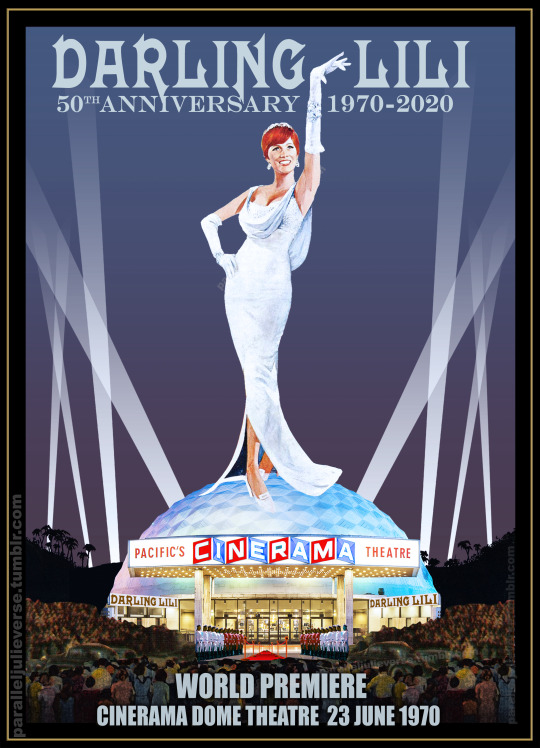
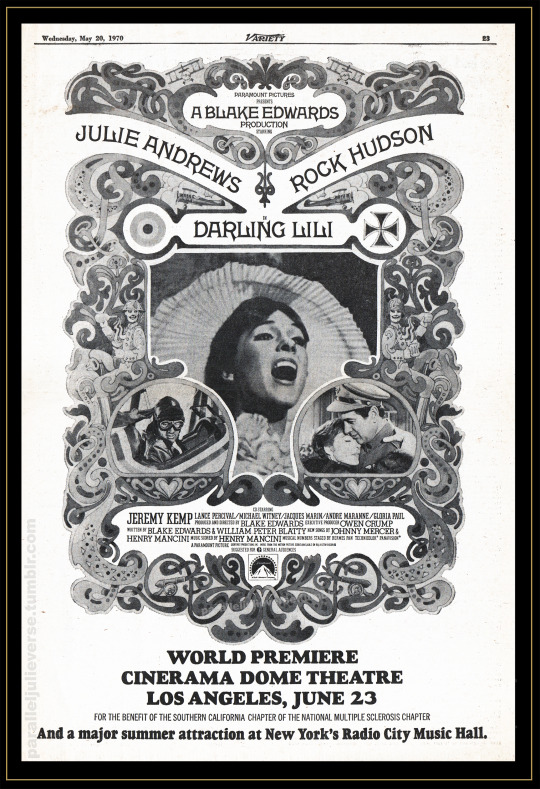
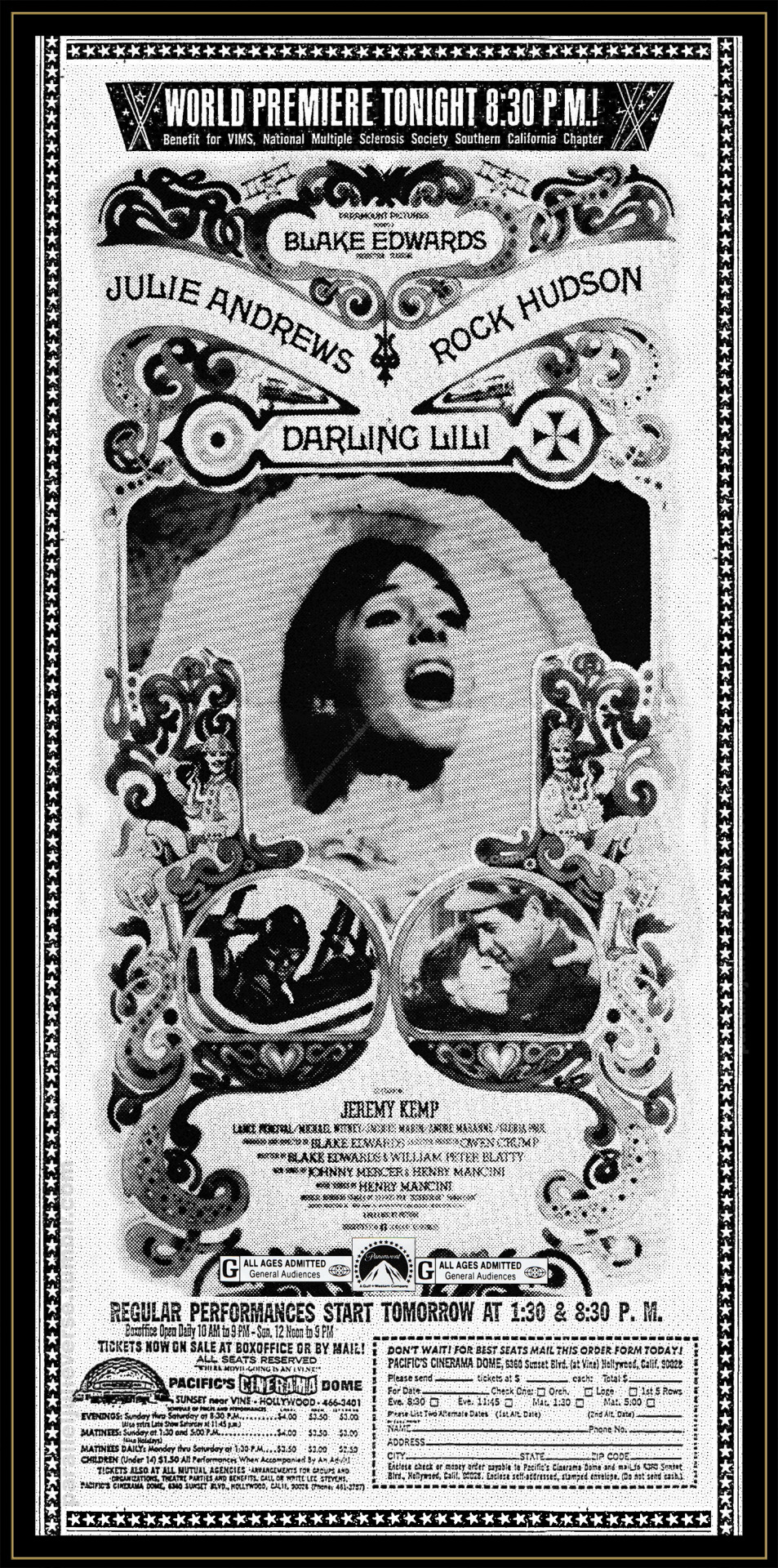
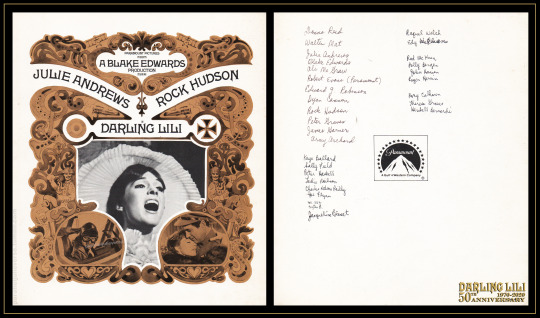
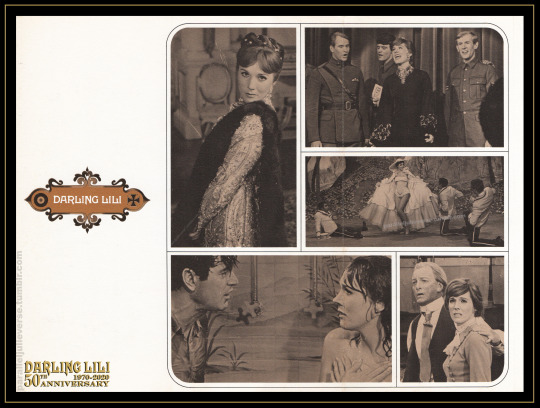
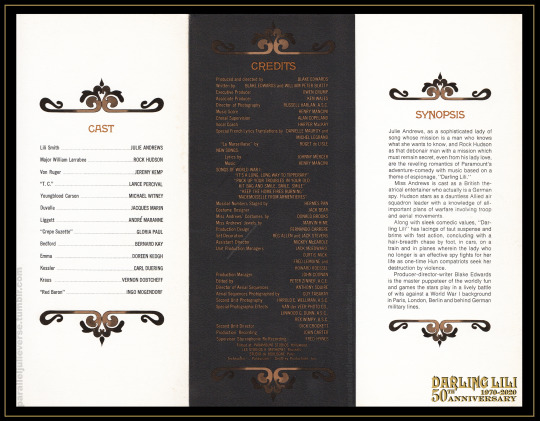
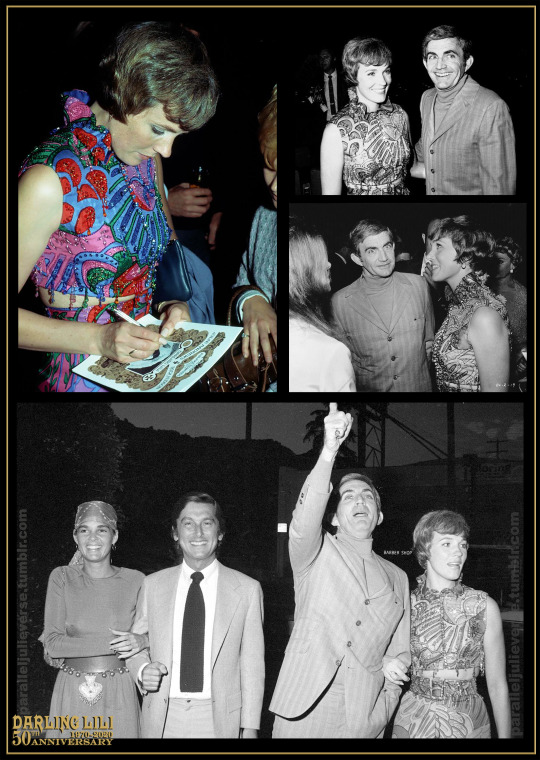
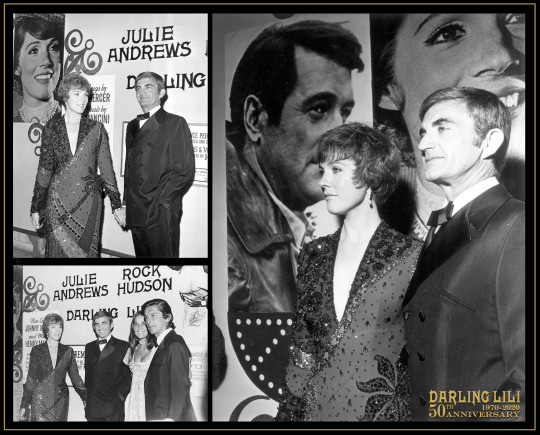
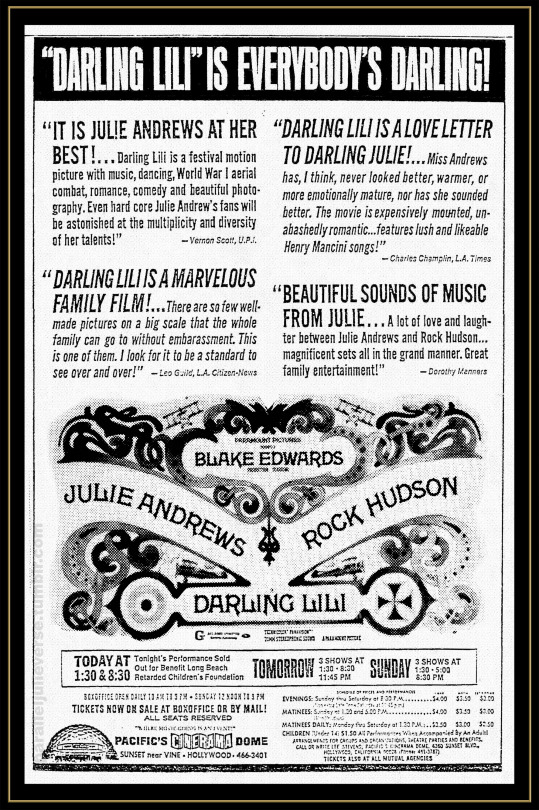
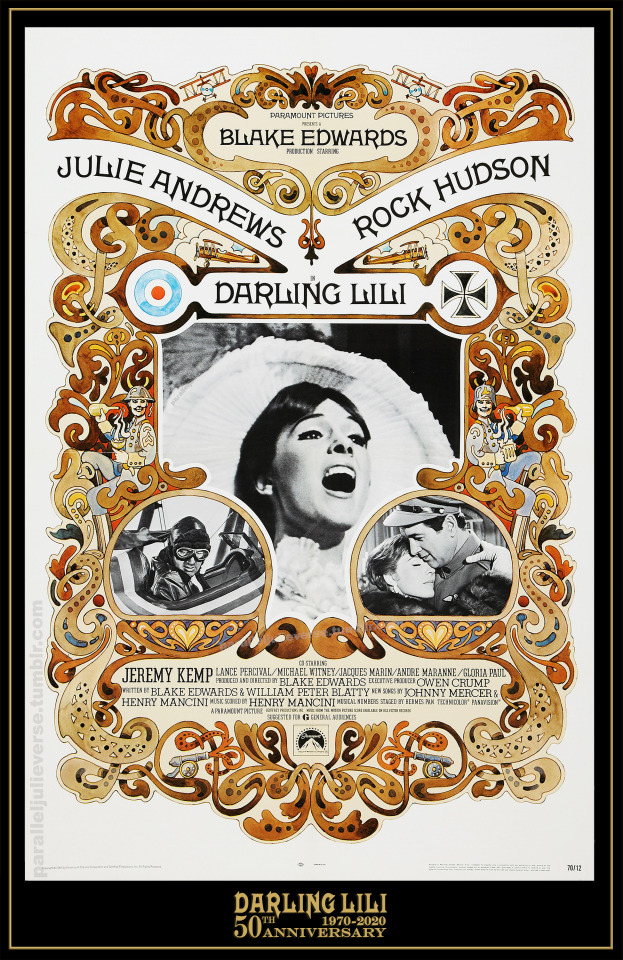
An Angel from Heaven Come to See Us: Darling Lili Turns 50
This week fifty years ago, Darling Lili -- the last of the big Julie Andrews screen musicals of the 1960s -- had its long-delayed World Premiere at Hollywood’s Cinerama Dome on 23 June 1970.
The event marked the symbolic endpoint of a three-plus-year marathon in which the ill-fated production was beset by an endless stream of problems and delays from inclement weather and union pickets on location to studio takeovers and shady refinancing deals (Bart, 63-72; Dick, 146-48; Wasson, 146-48). This litany of setbacks saw the film’s already sizeable budget blowout to era-record levels estimated anywhere, depending on who you spoke to, between $14-25mill. (Warga, C-20; Wedman, 7-A; Kennedy, 175-77). Egos clashed, tempers frayed and recriminations flew with writer-director, Blake Edwards, blaming Paramount Pictures for imposing impossible demands, and studio executives firing back counter-accusations of reckless indulgence and profligacy (Oldham, 24-25; 44-45).
That this highly publicised drama played out against the backdrop of the greatest economic downturn to hit Hollywood in half a century garnered Darling Lili an unenviable advance reputation as “the archetypal flop among big budget Hollywood productions” (Oldham, 44). “Rarely has so much bad word of mouth preceded a picture,” wrote the Saturday Review, “As the shooting schedule increased, as the costs mounted, everyone was certain that Darling Lili would prove to be a landmark disaster” (Knight 22). Another widely syndicated newspaper article dubbed it, “The Most Maligned Movie Ever,” prompting Blake Edwards to fume: “I’ve never known of an important picture in production so talked about, whispered about, and, yes, lied about as Darling Lili” (Manners, B5).
Adding fuel to widespread perceptions of the film as a legendary bomb in the making, the release of Darling Lili was held up for over a year by nervous studio execs. By 1969, Paramount had more big budget roadshow product in the pipelines than any other Hollywood studio (“Par’s Big”, 3). Panicked by the repeated failure of roadshow releases, in general, and the growing cultural backlash against big budgeted musicals, in particular, the studio feared they were “on the verge of an unprecedented financial disaster” and vacillated over how to proceed (Farber, 3). They ordered competing rounds of edits to the film, taking material out to secure a G-rating, then reinserting other material in an effort to broaden appeal (Manners, B5; “Par’s Lili Rated G”,5). There were even rumours the film might not get a release at all. It is “hiding somewhere” and seems to have “just evaporated” noted one newspaper report in late-1969 (Gussow, 62; Benchley, 9).
In December, Paramount finally held two sneak test screenings of Darling Lili in Oklahoma City and Kansas City which proved sufficiently positive for the studio to green-light release (“Kansas”, C2). After the test screenings, Robert Evans, production chief at Paramount and longtime vocal critic of Blake Edwards’s direction of the film, sounded an uncharacteristically upbeat note. “At the end of the film, there was a standing ovation,” he enthused, “and almost all the patrons stopped in the lobby to fill in comments cards...term[ing] Darling Lili as excellent, with special acclaim for both Julie Andrews and Rock Hudson” (Muir, 2-S).
In January 1970, it was announced that Darling Lili would premiere that summer as a hardticket attraction at New York’s Radio City Music Hall (”Par Gets”, 3). The following month, a series of exhibitor previews was held in five major US cities but, in a telling sign the studio still harboured reservations about the film, the trade press was pointedly excluded from all advance screenings ("Not Ready”, 6). This same lingering disquiet resulted in a radically scaled back approach to the film’s release and marketing.
Originally planned as a reserved-seat roadshow attraction, Darling Lili was ultimately repositioned by Paramount as part of what they called their “Big Summer Playoff,” a package of eight films given saturation releases during the summer off-season starting in June (“Paramount’s Summer Playoff”, 5). Only New York and Los Angeles would screen the film as a 70mm reserved-seat attraction; elsewhere, the plan was for the “pic to quickly saturate every major and minor market with single-house firstruns and key city multiples” (ibid.). In an era when studios typically gave their top films staggered releases and only ever issued B-product or second-runs widely during the quiet summer months, this new-style release strategy had a decided air of dump-it-and-run desperation.
The apparent lack of care and finesse in the release of Lili did not go unnoticed. “Darling Lili undoubtedly rank[s] among the unusual summer attractions,” commented one newspaper article, “since one would expect to see th[is] multi-million dollar production around holiday time” (Sar, 4-B). Another bluntly opined that Paramount “seems to have dumped the expensive movie rather than spend any more on it” (Taylor, 21-E). Even Julie, normally the soul of diplomatic discretion in such matters, expressed public dismay at the studio’s handling of the film’s release:
“Three weeks before the opening, there was no advertising campaign. None whatsoever. Paramount didn’t seem to know how it was going to sell the picture--or if. I simply can’t understand an attitude like that” (Thomas, 13).
The sudden shift to a summer saturation release also meant the film’s premiere had to be rescheduled as New York’s Radio City Music Hall wasn’t available till July. In late-May, a matter of mere weeks before the film was set to bow, Paramount announced Darling Lili would now make its world premiere at the Cinerama Dome in Hollywood on June 23 before rolling out nationwide the following day (“‘Darling Lili’ to Premiere,” W-2). The New York premiere, meanwhile, would remain at the Music Hall but delayed a full month after the rest of the country.
Putting on a brave face, Julie and Blake did their best to launch their film. On June 18, they attended a special press preview and celebrity reception hosted by Robert Evans and his then partner, Ali McGraw, at the Director’s Guild Theatre (Sar, 24-A). Dressed in a modish psychedelic Pucci pantsuit -- which fans of Julie-trivia will note was a recycled outfit from her recent NBC TV special with Harry Belafonte -- Julie looked relaxed and radiant or, as one columnist put it, “peachy dandy in her wild patterned party pants” (Browning, 2-13). At the after-show reception, she and Blake mingled warmly with a host of Tinseltown notables including Edward G. Robinson, James Garner, Walter Matthau, George Peppard, Raquel Welch, Sally Field, Dyan Cannon, and Peter Graves (ibid).
The following week, Julie and Blake were back for the premiere proper at the Cinerama Dome on 23 June. Dressed to kill in a sleek beaded cocktail gown, Julie posed for press shots on the red carpet with Blake, Robert Evans and Ali McGraw, and co-star Rock Hudson who attended with longtime friend and agent, Flo Allen. Sponsored by the Southern Californian chapter of VIMS, Volunteers in Multiple Sclerosis, the premiere attracted a capacity crowd with an invitation-only champagne supper held at the theatre after the screening (“Premiere”, IV-8) .
For all the old-school Hollywood trappings of the premiere, the American roll-out of Darling Lili was afforded little sense of showmanship or distinction. The Cinerama Dome would be the film’s only fully reserved-seat roadshow presentation (“’Darling Lili’s’ One Reserve,” 7). The film’s run at New York’s Radio City Music Hall -- which will likely be the subject of another post next month, time permitting -- was another exception but it had a hybrid mix of partial reserved and general admission. Elsewhere, the film was released in what could only be described as a woefully slipshod manner.
The day after the World Premiere, Lili was issued simultaneously to an idiosyncratic assortment of theatres and even drive-ins across the United States including such out-of-the-way places as Lubbock, Texas; Hattiesburg, Mississippi; and Mason City, Iowa. Conversely, several major metropolitan markets didn’t get the film till much later, and some didn’t show it at all. When the film ran it was often booked for a flying season of a week or two -- in some instances, just a few days -- and given little promotion or build-up.
On a PR trip to San Francisco, Blake Edwards was reportedly incensed to discover that Lili was being shown at a local theatre on a double-bill with The Lawyer, an R-rated crime drama (Caen, 6-B). But this was far from an isolated instance. A survey of newspaper advertising from the era shows that, throughout this initial release period, Darling Lili was widely double-billed in US theatres with a range of questionable screen-mates including Downhill Racer, True Grit, Norwood, The Sterile Cuckoo, and Lady in Cement to name a few.
Much like the film’s chequered release pattern, reviews of Darling Lili were sharply mixed. Contrary to the apocalyptic predictions, though, there were surprisingly few outright pans and quite a number of good, even glowing, notices--certainly enough to furnish choice grabs for newspaper ads. Moreover, a common refrain among even lukewarm crits was that the film was far from the disaster everyone anticipated:
“Darling Lili [is] the musical comedy a lot of people have been expecting to be a bomb, but which turns out to be a quite likeable movie” (Crittenden, D-10).
“When a movie becomes notorious like this, everyone expects it to be an unredeeming dud...I’m relieved to say Darling Lili is certainly nobody’s bomb” (Stewart, 28)
“[E]veryone was certain that Darling Lili would prove to be a landmark disaster. Happily, the opposite seems to be the case...it is definitely, joyously, what the industry likes to call an ‘audience picture’ (Knight, 22).
While many reviewers found aspects of the film wanting, they were mostly full of praise for Julie:
“Miss Andrews has, I think, never looked better, warmer or more emotionally mature, nor has she sounded better. The irony is that she projects a richness which is wasted here. It’s like getting Horowitz to play Chopsticks” (Champlin, IV-1).
“Andrews...is one of the last of the great English music-hallmarks. She can sing effortlessly, make a mug or a moue with equal facility, throw away a line and reel it back in with the best—when she is given half a chance. Her latest, Darling Lili, is only a quarter of a chance (Kanfer, 78).
“In Darling Lili...Julie Andrews is the most pleasant actress any audience ever had and that’s what counts...The picture’s weaknesses are Hudson and the war...But I think Julie Andrews is enough” (Geurink, 6-T).
“The best way to enjoy Darling Lili is to look upon it as escape fare [with] Miss Andrews’ golden voice for listening pleasure...While she deserves something much better than her role in Darling Lili, Julie Andrews...is still an out and out professional” (Blakley, 6-1).
“Miss Andrews...is absolutely perfectly suited to the title role. Her voice, her mannerisms, her beauty and her obvious delight with the entire project pay off in one of the finest performances of her career” (Fanning, 17).
“The film’s bright moments belong to Miss Andrews. She is a complete entertainer, and tho [sic] she is center stage for nearly the entire film, one never tires of her pure voice and intelligent acting” (Siskel, 12).
Alas, the better-than-expected reviews were not enough to save Darling Lili commercially. By the end of its domestic run, the film had earned a meagre $3.2mill in rentals, placing it 37th in Variety’s list of annual box-office rankings for 1970 (“US Films,” 184). Instructively, the film posted its best returns at the two theatres where it was exhibited with some modicum of prestige showmanship: the Cinerama Dome and Radio City Music Hall. In the case of the latter, Lili actually broke house records for a non-holiday release (“Radio City,” 12). Combined, these two venues accounted for over a third of the film’s entire North American boxoffice grosses. It’s a curious footnote to the whole sorry saga of Darling Lili which does suggest that, while the film would likely never have been a hit, it could certainly have done much better had its distribution and exhibition been more carefully managed. But that is a discussion for another time and another post...
Sources:
Bart, Peter. Infamous Players: A Tale of Movies, the Mob (and Sex). New York: Hachette, 2011.
Benchley, Peter. “1969 A Watershed Year for Motion Picture Industry.” Journal Gazette. 6 January 1970: 9.
Blakley, Thomas. “Julie Andrews Eyes a New Start.” Pittsburgh Press. 28 June 1970: 6-1.
Browning, Norma Lee. “Hollywood Today: Julie’s Reception.” Chicago Tribune. 22 June 1970: B-13.
Caen, Herb. “It’s News to Me.” Hartford Sentinel. 5 August 1970: 6-B.
Canby, Vincent. “Is Hollywood in Hot Water?” New York Times. 9 November 1969: D1, D37.
Champlin, Charles. “Movie Review: ‘Darling Lili’ Has World War I Setting.” Los Angeles Times. 24 June 1970: IV-1, 13.
Crittenden, John. “’Darling Lili’ Surprises by Being Very Pleasant.” The Record. 24 July 1970: D-10.
“’Darling Lili’ to Premiere in Hollywood June 24.” Boxoffice. 25 May 1970: W2.
“’Darling Lili’s’ One Reserve Seat Date.” Variety. 3 June 1970: 7.
Dick, Bernard F. Engulfed: The Death of Paramount Pictures and the Birth of Corporate Hollywood. Louisville, KY: University of Kentucky Press, 2015.
Fanning, Win. “The New Film: Andrews, Hudson in ‘Darling Lili’ at Squirrel Hill.” Pittsburgh Post-Gazette. 25 June 1970: 17.
Farber, Stephen. “End of the Road?” Film Quarterly. 23: 2. Winter 1969-70: 3-16.
Geurink, Bob. “Julie’s Pretty Darling in ‘Lili’.” Atlanta Constitution. 11 July 1970: 6-T.
Gussow, Mel. “Excitement Fills Premier of ‘Dolly’: But Air of Festivity Belies Future of Movie Musicals.” New York Times. 18 December 1969: 62.
Higham, Charles. “Turmoil in Film City.” Sydney Morning Herald - Weekend Magazine. 25 May 1969: 19.
Holston, Kim R. Movie Roadshows: A History and Filmography of Reserved-Seat Limited Showings, 1911-1973. Jefferson, NC: McFarlane and Co, 2013.
Kanfer, Stefan. “Cinema: Quarter Chance.” Time. 96: 4. 27 July 1970: 78.
“Kansas City.” Boxoffice. 22 December 1969: C2.
Knight, Arthur. “How Darling was My Lili.” Saturday Review. 18 July, 1970: 22.
Krämer, Peter. The New Hollywood: From Bonnie and Clyde to Star Wars. London: Wallflower, 2005.
Manners, Dorothy. “The Most Maligned Movie Ever.” San Francisco Examiner. 15 March 1970: B5.
Mills, James. “Why Should He Have it?” Life. 7 Match 1969: 63-76.
Muir, Florabel. “Hollywood: It Snowed Customers.” Daily News. 21 December 1969: 2S.
“Not Ready for Trades But Exhibs See ‘Lili’.” Variety. 28 January 1970: 6.
Oldham, Gabriella, ed. Blake Edwards: Interviews. Jackson: University of Mississippi Press, 2018.
“Par Gets Hall’s Summer Spot for its ‘Darling Lili’.” Variety. 21 January 1970: 3.
“Para. Sets Preview Series in Five Cities for ‘Lili’.” Boxoffice. 26 January 1970: 10.
“Paramount’s Summer Playoff Strategy: 5,000 Bookings for Eight Major Films.” Variety. 3 June 1970: 5.
“Par’s Big Roadshow Splash.” Variety. 25 June 1969: 3.
“Par’s Lili Rated G.” Variety. 24 September 1969: 5.
“Premiere.” Los Angeles Times. 25 June 1970: IV-8.
“Radio City Music Hall’s All-Time Boxoffice Darling.” Variety. 5 August 1970: 12.
Sar, Ali. “Paramount Unveils Two Top Pictures.” Van Nuys News. 21 June 1970: 24-A.
Sar, Ali. “Curiosity Films: Plagued Studios Hope.” Van Nuys News. 28 June 1970: 4-B.
Siskel, Gene. “The Movies: ‘Darling Lili’.” Chicago Tribune. 22 August 1970: 12.
Sloane, Leonard. “At Paramount, Real Financial Drama.” New York Times. 28 November 1969: 48.
Stewart, Perry. “Warm Kiss from ‘Lili’.” Fort-Worth Star-Telegram. 1 Juy 1970: 28.
Stuart, Byron. "Pictures: Big Budget’s Big Bust-Up." Variety. 23 July 1969: 3, 20.
Taylor, Robert. “‘Lili’ Can Be Charming.” Oakland Tribune. 27 June 1970: 21-E.
Thomas, Bob. “Julie Andrews Praises ‘Lili’.” Courier-News. 15 September 1970: 13.
“U.S. Films’ Share-of-Market Profile.” Variety. 12 May 1971: 36-38, 122, 171-174, 178-179, 182-183, 186-187, 190-191, 205-206.
Warga, Wayne. “Stanley Jaffe: Paramount Risk Jockey.” Los Angeles Times. 24 January 1971: C1, C20-21.
Wasson, Sam. A Splurch in the Kisser: The Movies of Blake Edwards. Middletown: Weslayan University Press, 2009.
Wedman, Les. “The End of the Roadshow.” Vancouver Sun. 9 January 1970: 7A.
Copyright © Brett Farmer 2020
#julie andrews#Darling Lili#fiftieth anniversary#1970#cinerama dome#film premiere#paramount#film history#hollywood#classic film#blake edwards
36 notes
·
View notes
Text
The Fantastic Beasts Franchise and JK Rowling
Alright, so...hi everyone.
I don’t know how many people follow this blog anymore because my main blog of operation is now @alwaysahiccupandastrid - I still try to keep this blog relatively active though, just because it was my original blog, I’ve had it since I was 13, and I have so many memories attached to it.
I’m aware that a lot of the people who follow me, especially since late 2016, do so because a) I was a loud and proud Fantastic Beasts fan, b) I wrote some Newtina and Jakweenie fic, and c)...I don’t know. I literally don’t know why people bother following me anywhere because I don’t feel like I have a lot to say. But, anyway, many people probably follow me due to Fantastic Beasts and my posts/fanfics within the fandom.
Those who follow my active blog will already know my feelings and thoughts, but because of the fact many things about this blog - me, the posts for the last four-ish years, the url itself - are Beasts related, I felt it was necessary to come and write an actual post here instead of just reblogging things and calling it a day. I’ve always been very outspoken online, but I’ve been avoiding a certain topic of conversation on this blog for years now, and I’m finally in a place where we can discuss it.
I am, of course, talking about the hot topic that is JK Rowling.
Back in the days between FBAWTFT and FBTCOG, I was a very outspoken defender of JK Rowling and her decision to defend Johnny Depp’s inclusion in the films. Now, this is something I still stand by to this day, and due to the evidence that has since come out, I’m even more steadfast in the opinion that keeping Depp was a great decision. I am fully in support of him and the way he’s currently battling against his abuser. But that’s not what I’m here to talk about right now. As I was saying, back in the day, I was outspoken about the opinion that “we don’t know the full story” etc., and as a result I received very colourful anon messages. Now, to my knowledge, none of these were about JKR being a TERF/transphone, but I think it’s important to mention that at the time I scoffed at the idea she could be one. I openly admit that I didn’t listen to what other people - including actual trans individuals - were saying about JKR and her transphobia because I frankly didn’t want to admit it. I didn’t want to admit that the person who wrote something that saved my life could be so hateful and a bad person - that, and at the time I passed it all off as “wokeness out of control”.
It is now 2020. Up until last Saturday night, I was still in support of JK Rowling - I didn’t agree with some of the stuff she had said, but I was trying to be positive and have hope by telling myself that she didn’t mean to be transphobic, that she just didn’t know what she was doing was wrong, even though the evidence clearly showed otherwise (I.e. her liking transphobic / radfem tweets). I said to my followers on my Beasts page that instead of cancelling people outright, we should be attempting to educate them instead, and if they choose not to learn then fine. And, being 100% obvious, I didn’t want to admit it because I frankly already was feeling annoyed at two different Beasts cast members for different reasons: Ezra Miller (for choking a girl) and Dan Fogler (for his tweet about BLM - admittedly that was probably him being well intentioned but not saying it right). So yeah, I didn’t want to cancel another member of the Beasts “family”.
I had JKR’s tweets on notifications, and for the most part over the last few weeks, it was all about the Ickabog. However, on Saturday night I noticed that she had suddenly tweeted something completely different, and I looked at it. Given that I had adamantly defended her and said “freedom of speech” for so long, it’s telling that my first thought upon seeing her tweet was literally “for fuck sake, Jo, why”.
I won’t post her tweets here but to sum that first tweet up, it was her being annoyed over the term “people who menstruate” being used in an article instead of “woman”, and mockingly saying “there used to be a word for that” before pretending she didn’t know the word. She knew that tweeting it would start arguments and anger, and yet she still made the decision to do so. Her follow up tweets frankly dug the hole deeper; she tried to defend herself by saying, to sum it up, “I have a butch lesbian friend who agrees with me” “I just care about women’s rights!” And “IF trans people were marginalised I’d march with you!” (“If”, of course, being the real kicker here because what do you mean IF. They ARE. Every DAY.)
Since then, JKR has written an essay on her website defending herself and her opinions, and yes, I read it. I read it a few times, in fact. At first, I felt my anger simmer and felt I had been too hasty to make anti JKR jokes, that I was wrong...but then I read it again properly and realised that what she had written was a piece that turned herself into the victim, and that despite putting on the appearance of her saying she supports trans people, including the phrases “I support trans people” and “of course trans women are real women”, she still spewed much transphobic vitriol and hate. She cited no sources for any of her proclamations or statements about statistics, implied that trans men transition to escape their “womanhood”, that trans women are men in dresses, that trans women are dangerous to “real” women (aka cis women) and shouldn’t be allowed into women’s changing rooms or toilets. There was also the autism comment, and the implication of autistic girls somehow not being able to make decisions or whatever.
I’m going to get straight to the point: I don’t support JK Rowling or her radical feminism.
As someone who is a proud feminist (libfem?), I can honestly say that never have I felt threatened or like I was being silenced by the inclusion of trans women in feminist spaces or conversation. Never. In my second year at sixth form, I was in charge of the LGBTQ+ club until a new leader with better leadership skills could step in, and - put simply - that year, the club was made almost entirely of first year transgender students. Even though I had called myself a trans ally for years, I realised there was a lot I didn’t know, and I learnt quite a lot from these students. I continue to still learn today. They were some of the nicest and most intelligent people I got the chance to meet, and I can truly say that at no point was I ever worried to be in a room alone with a trans woman, nor was I concerned about which bathroom they went in - bathrooms are bathrooms. Speaking of bathrooms...when I was at uni during a particularly tense rehearsal a few weeks before our final show last year, a guy in our group made me cry and I ran to the women’s bathroom to escape. Not only did the other girls come to comfort me, but you know what? The guy came in and apologised profusely to me. Did any of us girls give a shit about having a guy in our toilet? Absolutely not. It’s a fucking toilet. And, on that note, I was never worried about a trans woman or even a cis man attacking me in the toilets. You know who DID attack me in the toilets regularly? Other cisgender women.
As a feminist, I fully support trans women and am not threatened by the inclusion of trans women in women’s spaces or in women’s rights discussions. While I agree that cis women and trans women inevitably go through different struggles, at the end of the day, we all identify as women and are women. I think that if your feminism is so threatened by the existence of trans women - TERFs, RadFems, JKR, looking at you - then your feminism is flimsy and not feminism at all.
As a woman, I find it highly offensive that JKR and many RadFems focus so much of womanhood and feminism on an involuntary biological function that, frankly, many of us would rather do without. Yeah, I’m talking about periods - no matter how proud I am to be a woman, I still fucking hate periods and would get rid of mine if I could without erasing my chance of having kids someday. I can hear the RadFems accusing me of “internalised woman hatred” for saying I hate my periods, but you know what, they suck and they hurt and fuck them. The fact that JKR (also the the radfem movement) reduced “women” to just people who menstruate and can have children, and vice versa, is incredibly offensive and misogynistic. For a start, trans men menstruate, intersex people can, non binary can etc. Next, not even ALL cis women have periods - women who are menopausal, young women who haven’t started puberty yet (some do start very late), some women don’t have regular cycles, some women have medical problems that affect their cycle, some women are on birth control that can stop their cycles. So the idea of women being defined as “those who menstruate” is offensive not only to trans/intersex/non binary individuals but also to cis ones too.
As I write this, I’m a 22 year old woman who is still learning and changing every day, and one of the things that I’ve found myself thinking about recently - especially since we’re in lockdown and we have nothing BUT time to think - is about myself and my identity as a woman. What prompted this was when I saw Greta Gerwig’s adaptation of Louisa May Alcott’s beloved book, “Little Women”, which I’ve since read, for my birthday back in January, and I left the cinema feeling exalted and powerful with my own identity as a woman. (I’ll be returning to LW in a bit)
After some thinking, I’ve realised some things. For me, my identity as a woman is not just because once a month my uterus decides to shed; I do not identify as a woman just because I have certain physical features. I am not a particularly feminine person either, and I’m what some may call a “tomboy” (a phrase I actually don’t mind but I know a lot of people do for understandable reasons since it’s a phrase designed to differentiate people who don’t conform to society’s expectations etc) because I prefer video games and more geeky stuff to shopping or dressing up or make up.
For me, there is no one way a person has to be or appear in order to identify as a woman. Women are beautiful, complex human beings; we are not defined by our genitalia, by an involuntary biological process. Women are strong, intelligent, and interesting people - no two are the same. For example, some decide to raise families, some choose to pursue a career, some do both - all of these are valid and none are more “feminist” or “womanly” than the others, because it’s our as women. I guarantee that if you lined up every single woman in the world - cis AND trans - no two would be the exact same.
I mentioned “Little Women” earlier, and as I was pondering over what makes me identify as a “woman”, I thought a lot about a certain quote from the 2019 film that has stayed with me since it was first said in the release of the trailer. It’s spoken by Jo March to her mother, and I’ve started to understand what for me makes me a woman.
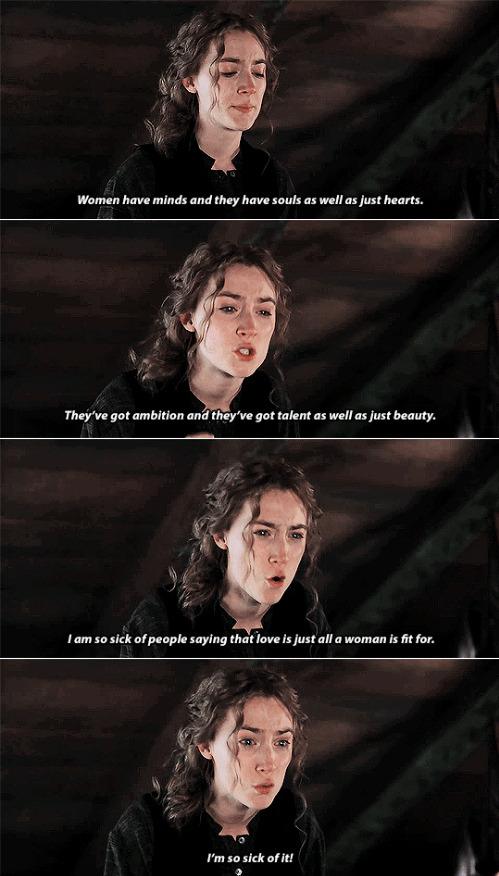
For me, being a woman is all of this: having minds, hearts, souls, ambition, talent, and being beautiful each in our own ways. Women are capable of love and empathy, capable of desire, capable of the most complex and human feelings and emotions, and coming out the stronger for it.
Sex is one thing; gender identity is another.
I won’t dissect every single thing JKR wrote in her essay, but I will just say this: her comments regarding autistic girls are extremely tone deaf and she does not speak for those with autism. I’m going to be honest and admit something here I haven’t before: I have not been diagnosed with autism or aspergers but I AM currently on the waiting list to see someone who COULD diagnose me. Apparently I show signs of a potential diagnosis, so...we’ll have to see. But I have friends who are autistic, and they’re disgusted by JKR trying to use them to support her TERF arguments. Autistic and other neurodivergent people are absolutely capable of making decisions and are NOT people who need to be babied or have their hands held, to be told who they are. It’s incredibly ableist of JK Rowling frankly.
I would also like to point out... I’ve seen people saying “but she doesn’t hate autistic people, Newt is autistic!!!” - yes, but JKR didn’t write him as autistic. Eddie Redmayne chose to play Newt as autistic - JK Rowling didn’t do shit.
It’s also time that I acknowledge that both Potter and Beasts inevitably hold JKR’s problematic views, and that by denying her ownership of her work, we’re not holding her accountable for the horrible things she’s done. This includes - but is not limited to -:
Anti-Semitic stereotypes in the goblins
Lycanthropy being used as a metaphor for AIDS - an illness that is heavily associated to the gay community, and also there was the panic of the AIDs crisis in the 90s where much misinformation and homophobia was generated and spread because of it.
Adding further to the lycanthropy point, one of the infected individuals - Greyback - is stated to have a sick preference for infecting children. Not only are werewolves tied to harmful gay/AIDs stereotypes, but also to the disgusting and frankly wrong notion that gay people are pedophiles.
The only Asian character is called Cho Chang. Cho Chang. That’s two steps away from outright just calling her “Ching Chong”. It’s not a name an actual Asian person would have.
The Goldstein sisters are probably distantly related to Anthony Goldstein, who JKR confirmed (on Twitter of course) is Jewish, meaning that Tina and Queenie are most likely Jewish too (and Goldstein is a Jewish surname). However, despite the fact that the first FBaWTFT is set DURING Hanukkah in 1926, there’s zero signs of them celebrating or observing it. Maybe that’s more on set design than anything else, but come on - if I, a fanfic writer, can do some research, JK/the crew of a major movie can too!
Adding on from that, gotta love how one of the JEWISH main characters then decides to join the Wizarding world equivalent of Hitler. I already had problems with Queenie’s characterisation in CoG, but that’s the icing on the cake.
POC/Black characters - in both series but since I’m a Beasts blog... Seraphina Picquery, a Black female president serving a term during a MAJOR wizarding world crisis, is severely reduced to have only 3 lines in CoG. Nagini’s only purpose is to be the only friend of Credence, a white man, before he joins Wizard Hitler and abandons her; she’s also an Asian character who we know one day permanently becomes a SNAKE, and who goes on to actually have a piece of Voldemort’s soul inside of her?? And some do see her as his slave, though you could argue that she’s actually the only being that he holds any love or respect for. Leta Lestrange is a half-black woman who is killed/literally sacrifices herself for TWO WHITE MEN, and who’s death was literally confirmed to have been added in last minute.
Also, the whole Lestrange storyline was fucking nasty: white Lestrange Sr imperius-ed a black woman (Yusuf Kama’s mother), raped her, and she then died in childbirth. I’m sorry, what the fuck??
In Harry Potter, Seamus is a terrible stereotype of an Irish person - he likes to blow things up. Look up the IRA and their bombings. Fucking Irish stereotype. As someone with Irish grandparents and who is proud of their Irish heritage, this really pisses me off.
Let’s not forget the whole Native American cultural appropriation. That truly speaks for itself.
So here is where I speak candidly to everyone who follows me and/or sees this post. While Beasts is no longer my No. 1 fandom these days, it and Potter still hold a huge piece of my heart. I have 5 wizarding world tattoos, so much merchandise, and I can safely say that being a fan of both series has shaped me as a person. Both of those series helped me get through the darkest days of my life, including bullying at school, my Nan passing away, and my mental health struggles.
This is why what’s happened has impacted me so much and broken my heart. For me, it feels like it’s tainted now because of Jo and her views. I know that we should separate the art from the artist, but when her views are so clearly woven into the very fabric of the Wizarding world, it’s a huge problem.
Here’s another part of the dilemma - I do not wish for the Beasts films to be cancelled. I’m well aware that the *cough* people who dislike me will say I’m trying to be negative, trying to boycott the series blah blah blah, but that’s truly the last thing I want. I still love the story, the characters, the soundtrack, and I want to know how it ends, if only for my own piece of mind. It’s also important to add that by boycotting Beasts, it’s also harming the hard working thousands of others who worked on the films: the cast, the crew, the extras, the musicians, etc., not to mention the fans who actually are invested in the series and have taken solace in it. It’s not fair for them to all suffer over the actions of one TERF.
This is one of my biggest worries, however: the Fantastic Beasts films do NOT have a good reputation as it is. The second film was boycotted by some due to Depp, and now there’s talk of people boycotting number 3 because of JK Rowling. Lots of people already talk hatred about it, and this will only fire that hatred up even more.
There’s also talk of Eddie Redmayne potentially being kicked from the franchise due to a “leak” that he doesn’t want to work with JKR anymore, but this could be sensationalist news reporting. But if it came down to it, I can honestly say that I would rather continue to have Eddie play Newt than keep JKR as a writer. Eddie has done more for Newt than even JKR has, and if he goes, then that will be the last straw for me within the fandom. That will be when I take a sharp exit out, sell my FB merch and have my tattoos covered.
To add, the Fantastic Beasts scripts are...not great. Or, at least, what we saw on-screen wasn’t. Maybe that’s David Yates being the literal worst (fuck you, Yates, you suck) and cutting all the parts with strong female characters, but I honestly don’t think that JKR can write screenplays well at all. I think she’s clearly better at writing books, and that’s fine - books obviously allow for more time to explore characters and story/plot arcs etc, and film scripts offer way less of those chances. I don’t think screenplays allow her to write what she needs to in order to tell the story she wants to, hence why CoG was kind of a hot mess. So maybe it’s just that she’s not suited for screenplays and should stick to books.
Honestly, I kind of just wish that WB would hire another person to finish writing the Fantastic Beasts movies - obviously they’d have to keep JKR on board to tell them the actual plot, but get someone who can actually write screenplays and not be problematic to write them.
By now I’ve gone on long enough that I’ve forgotten my original intent while writing this, so I’ll try to sum up and end now. In short, I am extremely disappointed in JK Rowling and do not support her or her views any longer.
I don’t know how any of you guys are feeling but I would be interested to hear other people’s thoughts, especially other Fantastic Beasts fans. I want to also add that, as always, my DMs and inbox are always open - if not here, then always at @alwaysahiccupandastrid where I’m more active nowadays.
Finally, you guys don’t need me - a white cis woman - to tell you this but you’re all valid and magical and fuck JK Rowling. Her characters would all be ashamed of her, and the characters we grew up with would not stand for the bigotry and vile hatred she spreads under the guise of ““protecting women””. Several of the amazing actors from Potter and Beasts have spoken out against her and her tweets: Daniel Radcliffe, Emma Watson, Bonnie Wright, Katie Leung, Chris Rankin, Eddie Redmayne. Some have been...less inspiring (Tom Felton, Evanna Lynch, looking at you two 👀)
I’m sending love to everyone right now. I wish I could say something more useful but I’ve spoken enough - I’ve made my opinion clear. I love you all, please stay safe.

#fantastic beasts and where to find them#fantastic beasts: the crimes of grindelwald#jk rowling#harry potter
24 notes
·
View notes
Text
The Rise Of Skywalker Review [SPOILERICIOUS]
=0=
I’m going to post all the SPOILER stuff way below in section 3, so as not to ruin anything for anybody who hasn’t seen the movie yet.
You’ll get plenty of warnings.
=1=
In my old age I’m starting to divide creative works into three groups: Good, bad, and not-so-good.
A good creative work is any where the strengths overwhelmingly outweigh the weaknesses; a bad one is the obverse.
A not-so-good work is one where the strengths and weaknesses balance each other out.
It’s the kind of a work that will doubtless please those audience members who really enjoy the strengths in it, and equally irritate those annoyed by the weaknesses.
In my estimation, a not-so-good work is one done with straight forward intent and as often as not, a fair degree of technical and aesthetic competency, but fails to jell as a cohesive whole.
No one need feel ashamed for enjoying a not-so-good work, and no one involved in the making of a not-so-good work should feel bad about their contribution (unless, of course, their contribution turns out to be one of the weaknesses that should have been avoided).
Theodore Sturgeon famously observed “90% of everything is crap.”
I think that’s a little harsh.
I agree with him that only 10% of anything is good, but think only 40% falls into the crap bin.
Most stuff falls in the 50% I call not-so-good.
Star Wars Episode IX: The Rise Of Skywalker is in that 50%.
. . .
The good stuff is really good.
Elsewhere I’ve posted my enthusiasm for Star Wars Episode VII: The Force Awakens and Star Wars Episode VIII: The Last Jedi hinge in no small part on just how emo Kylo Ren (Adam Driver) could get, and holy cow, does he ever deliver in The Rise Of Skywalker.
Easily my favorite parts of the picture.
Doesn’t really mesh with anything else in the movie but, hey, ya can’t have everything, right? (I’ll discuss his performance in a little more detail in section =3=.)
Other performances range from adequate to doing-the-best-they-can-with-the-material to okay-smartass-you-try-recreating-a-dead-actress-via-CGI.
The dialog in The Rise Of Skywalker is the worst of any film in the series, with the possible exception Star Wars Episode III: The Revenge Of The Sith, which I haven’t seen and have no intention of seeing (but more on that below…).
It’s not an attempt to depict characters talking, it’s a series of shouted declarative sentences.
Elsewhere I’ve referred to The Rise Of Skywalker as the best Jason Of Star Command episode ever made.
For those who don’t get the reference, Jason Of Star Command was a low budget albeit imaginative Saturday morning kid-vid Star Wars rip off by Filmation Studios.
To make sure the youngest kids in the audience understood what was going on, they tended to hammer home plot points repeatedly.
DRAGOS Jason! In just sixteen hours my space fleet will destroy Star Command!
STAR COMMAND Jason! Dragos is going to destroy us with his space fleet in just sixteen hours!
JASON Don’t worry, Star Command! I’ll stop Dragos from destroying you with his space fleet in sixteen hours.
NARRATOR (i.e., Norm Prescott) Jason has only sixteen hours to stop Dragos from destroying Star Command with his space fleet!
There is far too much of that in The Rise Of Skywalker.
Ten minutes into the movie, and there was already far too much of that…
The opening credit crawl reveals an off camera plot development that literally deserved an entire film of its own to fully explore.
There is no sustained coherent plot to The Rise Of Skywalker:
Well, we gotta do this,
now we gotta do that,
first we gotta find this thing,
then we gotta find that thing,
now I’m feeling blue,
now I’m gonna get encouraged,
etc., etc., and of course, etc.
Everything feel frenetic, not fast paced.
There are far too many scenes that exist just to sell action figures and toy vehicles.
There was a desire to tie off loose ends and say good-bye to favorite characters and that was a mistake.
It undercuts the urgency of the story (or rather, the desired urgency; the fact the film is called The Rise Of Skywalker means everybody in the freakin’ audience ALREADY KNOWS HOW THE DAMN THING IS GONNA END!
(This is not a problem unique to Star Wars. Gene Siskell famously upbraided Roger Ebert for spoiling the ending to the third Star Trek movie, to which Ebert retorted, “Oh, come on! They’re going to call a forty million dollar movie The Search For Spock and not find him?!?!?”)
There is one nice little breather scene (“little” only in screen time; visually it’s pretty big and impressive): The Festival of the Ancestors on the desert world Pasaana that gives a nice touch of exotic space opera flavor to the proceedings.
All of the Star Wars movies offer really great art direction and visual design, and The Rise Of Skywalker certainly delivers in that category.
Which makes the occasional mediocre special effects shots all the more obvious.
The Rise Of Skywalker has a few painfully obvious matte shots, a few shots obviously composed in post-production, and a few shots where the audience becomes aware the actors are performing in front of a greenscreen.
You can get away with mediocre visuals so long as there is consistency in their mediocrity.
If everything else consistently looks great, a so-so shot spoils the illusion; if everything consistently looks so-so, it’s simply part of the work’s look.
Indeed, you’re better off with consistently mediocre work highlighted by a few great shots than consistently great stuff undercut by a few mediocre ones.
Best thing about the movie is the complete lack of Jar Jar Binks.
=2=
Before diving deeper in The Rise Of Skywalker, let’s look at the series as a whole (just the numbered theatrical episodes, not standalone films, TV series, video games, comics, novels, etc.).
I’ve said the original Star Wars was the movie an entire generation had been waiting all their lives to see.
George Lucas wanted to do Flash Gordon but when Universal turned him down, created his own space opera.
Lucas, it needs be noted, is not a good writer.
Whatever visual talents he has, they don’t extend to telling a good story.
One can easily find early drafts of Star Wars online, and while they all share certain elements, they’re all pretty bad.
The development of Star Wars the movie grew organically with storyboard and production art, characters and incidents changing and evolving along the way.
It’s long been rumored that a more skilled writer than Lucas came in to do the final draft; one thing’s for sure, the shooting script is head and shoulders above the earlier drafts.
Star Wars the original Han-shoots-first-dammit theatrical release is very much a product of the 1970s.
20th Century Fox thought they had a good enough kiddee matinee movie for summer release; they expected their big sci-fi blockbuster of the year to be Damnation Alley.
Instead, they hit a nerve and found themselves with a blockbuster on their hands.
Lucas did show one great example of foresight: He trademarked all the names / characters / vehicles and held the licenses on them, not 20th Century Fox.
This gave him the war chest he needed to build the Lucasfilm empire.
And let’s give Lucas and his crew their due: They added immeasurably to the technical art of film making, as well as making several entertaining films.
What Lucas did not fully envision was how to mold his Star Wars material into a coherent and thematically cohesive saga.
He started out with grandiose plans -- four trilogies with a standalone film connecting each for a total of 15 movies -- but that gradually got whittled down to 12, then 9.
After Star Wars Episode VI: The Return Of The Jedi, Lucas put the Star Wars movie series on hold, waiting for film making technology to develop to the point where he could tell the stories the way he wanted to tell them.
Okay, fair enough.
But the problem is that while the film making technology improved, the technology of the Star Wars universe didn’t.
As I said, the original Star Wars is very much a 70s movie in taste / tone / style / sensibility.
While the designs look sufficiently sci-fi, they reflect robots and spacecraft designs of the 1970s -- in fact, even earlier in many cases.
That fit in with Lucas’ “used universe” look and the tag line “A long ago in a galaxy far, far away...”
But compare the original Star Wars with Stanley Kubrick’s 2001: A Space Odyssey.
Kubrick spent a lot of time researching where technology was heading.
Long before visual displays and vector graphics became commonplace in real world aircraft, he showed them being used in the future.
The first example of what we refer to today as a computer tablet appeared in 2001 as a throwaway background detail.
Kubrick’s next film was A Clockwork Orange and he successfully predicted punk culture a decade ahead of reality (his only mistake being the assumption white, not black, would be the base color).
Star Wars Eps I - III take place a generation before the original Star Wars movie.
Star Wars Eps VII - IX take place a generation after.
Name a two generation span since the start of the industrial age that is not marked by radical technological change that produces an ensuing change in the social order.
Now I grant you, the Star Wars universe isn’t trying to tell that kind of story, but the story it is telling is static.
Characters in The Rise Of Skywalker talk about cloning as if it were A Really Big Deal.
Cloning today is cutting edge bio-tech, to be sure, but it’s already common place.
It’s as if the Star Wars characters were getting worked up over steam engines.
One can intercut scenes from the movies and, unless one is a familiar with each movie, it’s impossible to tell one film from another.
Lucas’ financial success enabled him to issue edicts re Star Wars (and other Lucasfilm projects) that undercut the strengths of his projects.
Lucas is a technological guru and a savvy businessman, but he really struggles to tell a story.
Frankly, I think he would have been a better film maker if he’d spent a decade or so making American Graffiti scale movies, not space operas and epic fantasies and adventure movies.
His decision to make the original Star Wars the fourth episode in his saga and going back to start his story with his villain was fatally flawed.
I grant following the Skywalker saga from Anakin to Luke to Rey could work if it started with Anakin.
But what he did was the equivalent of the James Bond movies jumping back in time to follow the pre-Bond career of Ernst Stavo Blofeld.
(And the Bond movies, at least up until the Daniel Craig era, are all standalone films insofar as one does not have to see any of the previous films to understand and enjoy the one being watched, not does the sequence they’re viewed in matter. And the Craig films were conceived from the beginning as having a coherent overall arc, so in that case they are the exception to the rule.)
The joyous whiz-bang space opera of the original Star Wars got bogged down in a lot of meaningless politics and talks of trade treaties, none of which explained why anyone would want to conquer the universe in order to rule it as a decrepit, diseased dictator in a dark hole.
Look at Hitler and Stalin and Castro and Mao and the Kim family in North Korea.
These guys enjoyed themselves (well, Hitler did until things went south for him). They loved the attention and went around preening themselves in public.
The off screen Empire (and implied Emperor) of the original Star Wars served that film well: It was a story about a tactical conflict, not a treatise on the philosophy of governance.
Lucas’ universe does not make sense even in its own context.
And because of that, it becomes harder and harder to fully engage with it.
A sci-fi movie doesn’t have to explain everything, but it has to at least imply there is an underlying order that links up.
Lucas began subverting his own universe almost immediately.
The Force was originally presented as a spiritual discipline that any sufficiently dedicated intelligent being could gain access to. (Robots seem to be specifically excluded from The Force, implying it needs a biological connection. But that would seem to exclude intelligences that may not be organic in the commonly accepted sense of the word, which means such beings cannot appear in the Star Wars universe, which means…well, I digress…)
That was a big hunk of the original Star Wars’ appeal, the thought that literally anybody could become a Jedi if they so desired.
It speaks to a religious bent in audiences from many different cultures around the world, and it offers up an egalitarian hope that allows everyone access to the Star Wars fantasy (“fantasy” in this context meaning the shared ideal).
But already in Star Wars Episode V: The Empire Strikes Back Lucas began betraying his original concept, sowing the seeds for self-serving deception and innate superiority as endemic in The Force.
By the time he got around to Star Wars Episode I: The Phantom Menace, Lucas abandoned the hope established in the original Star Wars movie.
Now one has to be a special somebody, not just dedicated.
Mind you, that sort of story has its adherents, too.
Way back in the 1940s sci-fi fans were saying “Fans are slans” in order to claim superiority over “mundanes”. Today many Harry Potter fans like to think of themselves as inherently superior to “Muggles”.
It’s a very appealing idea, so appealing that the United States of America is based on it, the assumption being that white people are endowed with more blessings -- and therefore more rights -- than non-white people (add force multipliers such as “rich” / “male” / “Christian” / “straight” and you get to lord it over everybody).
Lucas with his stupid midichlorians robbed audiences of their healthy egalitarian fantasy and replaced it with a far more toxic elitism.
It appeals to the narcissistic stain in the human soul, and encourages dominance and bullying and cruelty and harm as a result.
It’s an elitism that requires a technologically and sociologically stagnant society, one where clones and robots and slaves can all co-exist and nobody points out they are all essentially the same thing.
A progressive society -- and here I use “progressive” strictly in a scientific and technological sense (though as stated above, advances in scientific fields invariably lead to changes elsewhere) -- does not let such conditions exist unchanged for generations.
As technology changes and improves, the culture/s around it change (and hopefully improve, too).
As I mentioned above, I’ve never seen Star Wars Episode III: Revenge Of The Sith.
My reason for not seeing it? Star Wars Episode II: Attack Of The Clones.
Little Anakin Skywalker and his mom are slaves in The Phantom Menace.
He saves the Jedis and Princess Padame’s collective asses in that movie.
Okay, you’d think at the end of the movie that Padame would hand Qui-gon her ATM card and say, “Here, go back to Tatooine and bail the kid’s mom out. He did a solid for us, it’s the least we can do for him.”
No, they leave her there because there is no desire to change the underlying social order of their universe.
There can be no changes in Lucas’ bleak, barren moral universe.
There can be no help, no hope, no improvement.
When an edict is issue -- be it Jedi council or Emperor (or president of Lucasfilm) -- it is to be obeyed without question or pause.
Daring to say one can change their status -- change their destiny -- results in tragedy (and ironically, proof that is their destiny).
It’s dismaying enough that a large number of people enjoy cosplaying Star Wars villains, especially storm troopers, as that seems to indicate they’re missing the whole point of why the rebels were striving against the Empire in the first place.
Originally that could be written off as (at best) just enjoying the cool costumes and props or (at worst) finding an excuse for bad behavior (i.e., “I vuz only followink orders”).
But Lucas’ tacitly endorsing a sense of innate superiority pretty much destroys everything about The Force that the original Star Wars audience found enlightening and ennobling.
The Star Wars universe has become at its core a very ugly thing, and The Rise Of Skywalker doesn’t really clean it up.
SPOILERS ahead.
=3=
Seriously, SPOILERS follow.
Holy crap, The Rise Of Skywalker is a damn mess.
Nice eye candy, but a mess.
It pretty much undoes everything good in the previous two episodes.
I’m glad it’s the “official” end of the original saga because now I never need to see another Star Wars movie ever again.
(Oh, I’ll keep my DVD of the original Star Wars and if I find Solo in a bargain bin somewhere I might pick that up, but as far as the rest of Star Wars goes, I am D.O.N.E.)
The series stopped making sense long ago, so I’m really in no mood to analyze why nothing links up or really works.
It’s full of absurd, stupid ideas, such as space barbarians galloping across the deck of a star destroyed on their space horsies.
The whole back and forth between among Palpatine / Kylo / Rey goes on for two long. If hating somebody is bad because it sucks you over to the Dark Side, then why doesn’t somebody start building Terminators that can track down beings with midichlorians and kill them? (They’ve got the technology to detect midichlorians, that’s canon.)
It’s not anywhere near a good movie. It’s not as bad as George Lucas’ Star Wars Episodes I - III, but it’s clearly the worst of the last trilogy.
The scene where Rey gets off camera encouragement from all the dead Jedi? It seemed awfully familiar to me, as if the writers consciously or unconsciously remembered the John Wilkes Booth / Lee Harvey Oswald scene in Stephen Sondheim’s Assassins where all the presidential assassins and would-be assassins past and future encourage him to plug Kennedy.
Not what I want in a Star Wars movie.
I think we may be seeing the end of Star Wars. It’s been crammed down our throats for too long. I’m aware of The Mandalorian series and how insanely popular it is, but y’know, sooner or later every pop culture craze dies out.
Star Wars has nowhere to go. Star Trek is hemmed in, too, but nowhere nearly as bad as Star Wars.
We’re about to enter a generational shift in America, and I wouldn’t be surprised if a badly dated 1970s sci-fi concept fails to make the cut.
It ends on a frustrating note, taking much too long to come to a close, far too much self-congratulatory bullshit, and the deliberate planting of clues for a future set of sequels should the Mouse start jonesin’ for that sweet, sweet Star Wars franchise money fix.
It’s a really bad script, and dragging Carrie Fisher’s digitally reanimated corpse into it and then killing her off by suicide is a damned stupid / offensive idea.
Mark Hamill’s ghost walking out of the flames of Jedi hell (thank you for that analogy, David Brin)? Wow, who didn’t see that one marching down the avenue?
Harrison Ford coming back as a memory / hallucination to tell Kylo to do the right thing? Skrue dat noiz.
(Though I have to say Kylo Ren is the best thing about the movie and his character turn parallels both Luke’s and Vader’s in The Return Of The Jedi only his is much more believable and poignant so dammit, Disney, you could have done a much better job with this movie than you did.)
The plot and pacing is straight out of a video game. First do this, then do that, now ya gotta do another thing -- feh!
And unless I misheard the dialog, this whole film supposedly takes place over a span of sixteen hours!!!
They visit a half dozen worlds, crash and repair spaceships, go undercover, get captured and escape, fight duels to the deal -- all in sixteen hours?!?!?
Yeesh.
And I’ll say this, the last line is wrong wrong WRONG.
If the Star Wars saga has taught us anything, it’s that Force users are a threat to everything.
They should be eliminated for the good of the universe.
Rey shouldn’t have buried the Skywalker lightsabers.
She should have destroyed them -- and the one she made, and any others she found lying around.
And when she’s asked at the very end what her name is, the answer should have been: “Rey…just Rey.”
I know I put The Rise Of Skywalker in the not-so-good bin, but truth be told, that’s the nostalgia talking; it’s only a eyelash away from being bad.
The whole epic saga is a failure as far as I’m concerned. One and done is the way to go; the moment it started making money as a toy franchise it went south.
© Buzz Dixon
2 notes
·
View notes
Text
Stuff I loved in 2018.
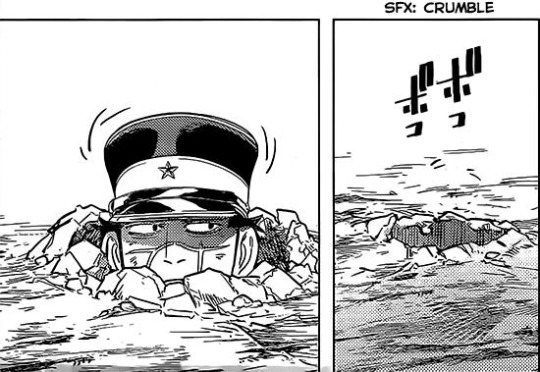
Its that time again. The end of a year and a look back on all the stuff I enjoyed. Honestly I almost wasn’t going to write this because I feel these posts are a lot of effort with very little reward, but there was a lot I experienced this year that I think was interesting and worth sharing. So let’s go.
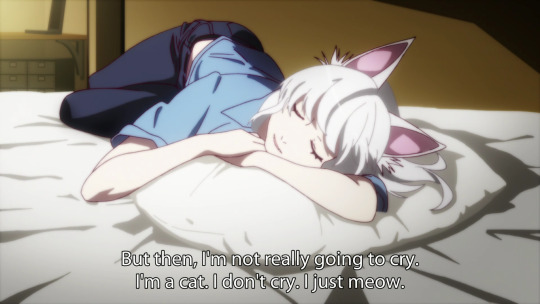
Roger Ebert once said “artistry can redeem any subject matter”. While I’m not sure any subject matter can be salvaged through an artistic eye, it can certainly help. If someone approaches a certain material with a clear vision and purpose to what they do they can create something truly fascinating. The Monogatari series is a very strange one. Its told in a non chronological order, there’s characters who say they’re one thing and reveal themselves to be something else, there’s a lot of references to other anime, the visual style changes sometimes radically, its incredibly meta, some moments of fanservice have a deeper meaning to them while others not so much. Me personally I think the series goes through periods of being brilliant as well as periods where it just is not up to the same standard as before. That said I kind of like that, I like that you go through so many different moods and style shifts. Not everyone will like that, some will get frustrated with the weaker seasons, but for me I think it all comes together and really made for something I won’t forget. I watched the entire series within a week and then later in the year I rewatched it all barring “Koyomimonogatari” which is one of those weaker seasons in my opinion. Despite its bulk, despite its tendencies, the Monogatari series just kept me hooked.
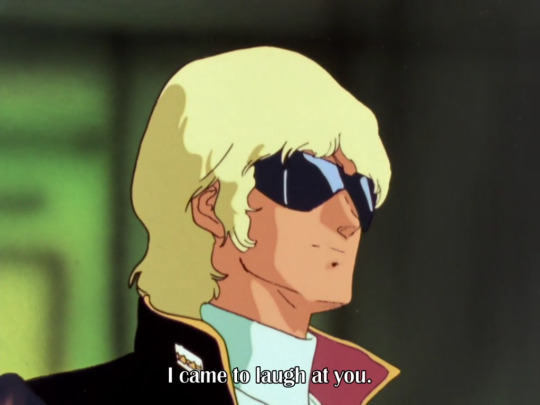
There comes a time where we all must accept certain truths. One of them is a lot of you don’t really understand mecha. I still see all of these reviews and comments claiming that mecha before “Evangelion” were all just light fluffy Saturday morning cartoon fare with little substance. This could not be further from the truth. The Gundam franchise from the very beginning was serving what I am going to refer to as a human element. It was not this soulless creation who’s only goal was to sell model kits. Whether it was Amuro’s PTSD from piloting the Gundam or Kamille and his tragic romance with Four or Char’s true motives during the original series there was always more going on than just giant robots shooting things. This isn’t even taking into consideration other installments like “War in the Pocket” where its a story of war from the point of view of a child and soldier. I have not watched every Gundam anime, I am sure there are some that were just there to exist as another installment in the franchise and didn’t necessarily push the franchise or genre into new areas. But what I have seen in “Mobile Suit Gundam”, “Zeta Gundam” “War in the Pocket”, “Unicorn”, “Iron Blooded Orphans”, and even the polarizing “ZZ Gundam” which I admittedly dropped were all very interesting and very unique experiences. Tomino really hit on something when he created the series and now we’ve come so far that we have a franchise so massive and large it needs an entire wikipedia article devoted to its cultural impact.
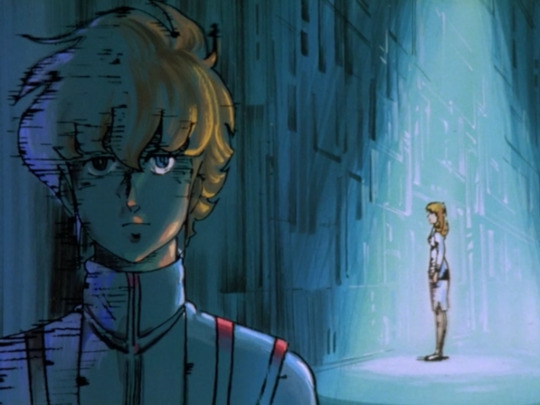
Once again, mecha that came before “Evangelion” were still displaying that human element many critics are convinced wasn’t there. In “Macross” its very prominent to the point where it feels like a driving force to the entire show as well as its film “Do You Remember Love”. We spend as much time with the characters and their developing relationships as we do with the mecha battles. The emphasis on music and culture as something that can create a change in the world is one of the themes synonymous with the franchise. While there certainly were times in the show where it leaned a bit into a comical area, I didn’t mind this. It was a show aimed at a younger audience and was trying to communicate these themes on their level so at times things can be a bit silly, but I appreciate what is being said so much that it does not feel like an issue. The heart is still there, the human element is still there. And more complex and serious sub plots are there too. Regardless when it comes to the film “Do You Remember Love” and the OVA “Macross Plus” things were certainly approached with a more mature voice, bringing the franchise to new places. I watched this prior to any Gundam anime in an attempt to get a better feel for the mecha genre. I wanted to expand my tastes and I’m very happy I did because not only did I love this I also want to really explore the genre now more than ever.
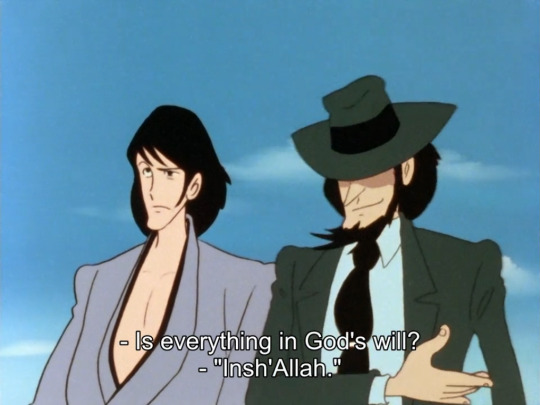
With the release of “Lupin III Part 5″ this year I was really turned onto that franchise. I ended up getting this massive itch to explore it when that anime wrapped and while not everything I found was a masterpiece it was a worthwhile endeavor. There’s something to Lupin the character and the series at large that manages to be both fun while also evoking a sense of coolness in spite of his goofiness. It was interesting to go through the various TV series and the movies and some specials and get a sense for how its evolved through time. Rewatching “The Castle of Cagliostro” I really enjoyed it a lot and other installments like “The Fuma Conspiracy” and “The Hemingway Paper Mystery” were hugely entertaining. I really liked “Lupin III part 4″ and “The Woman Called Fujiko Mine” too and the original “Lupin III” anime. I can still hear that voice singing “Lupin...he’s a nice man...but he’s cool...”. And objectively speaking green jacket is best jacket. I feel like this is a series that has undergone so much evolution through the various people that came in to work on it that there’s bound to be something that appeals to somebody. You just have to find it.
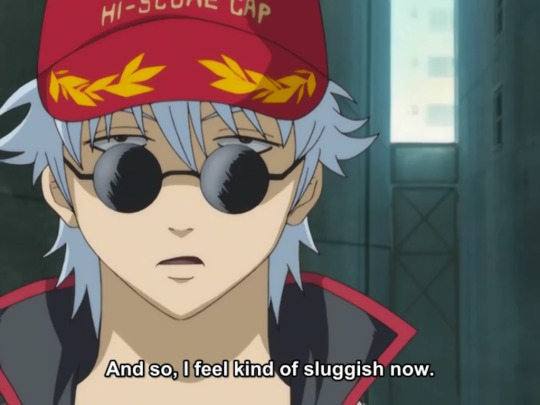
I spent a lot of time ignoring “Gintama” and its a bit of a shame that I did because this is a really fun series. Despite how long it is I really didn’t feel like it took me a terribly long time to finish it. And even though its goal is more on the comedic side of things, the series surprised me with how strong of an emotional punch it can provide. The cast of characters is one of the most likeable and fun that I’ve seen in a while and the seiyuu cast was very impressive. Everyone plays their character well and I get the sense they really enjoy working on it. Akira Ishida in particular seemed to really get a kick out of playing someone as ridiculous as Katsura when so many of his other roles lean more serious. And of coarse everyone loves Tomokazu Sugita as Gin. His voice just feels so right for a character like this and it was great having him for something this big when in other anime I’ve seen him in he’s only around for so long. I’ve also got to give the series credit for its female characters. There’s a really sturdy amount and they’re all occupying their own place in this world with distinct identities. This is something that makes this world feel more alive and expansive. Kagura is a character I need to applaud for the fact that she wasn’t there for some sort of lolicon fanservice or to have a really awkward crush on Gin or Shinpachi. No she just cares about food and her dog. What a queen. Speaking of Shinpachi he was the MVP of this series, good boy. And there’s our Shinsengumi boys and of coarse Gin himself, so many great characters. I am sure a lot of people look at how much there is to “Gintama” and get nervous at the size of it, but there’s really no need to. When it clicks with you then there’s no putting it down.
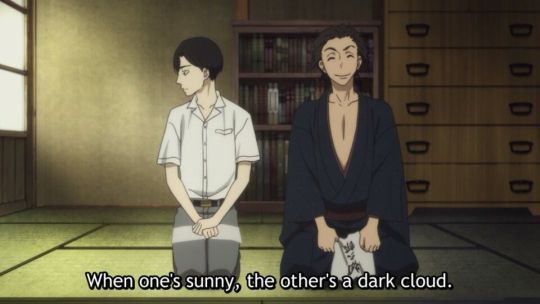
“Showa Genroku Rakugo Shinju” might be one of the greatest anime in recent years. It takes you through so many periods in this man’s life and the people around him and manages to hold you the entire way. Once again Akira Ishida is someone I need to give major credit to. He’s a very talented seiyuu and in this anime his performance was so impressive I was almost beside myself. Given the performance style the series is built around the cast all needed to be really great at reciting these stories and articulating them. And for the scenes where the characters are not on stage, when the interpersonal drama comes out, everything just hits in such a powerful way. I can’t remember how often I cried during this anime, but it never felt like I was being manipulated. It all felt as if it came through organically and easily. Even more subtle scenes like a character finding out he’s having a child hit on just the right emotions. If you are in the mood for a fantastic character driven drama this is absolutely one I’d recommend.
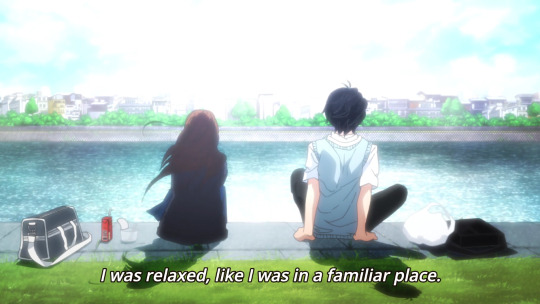
Speaking of character driven drama “Sangatsu no Lion” is another one to tune into. It initially presents itself as a very intense and dark story, but as the viewer stays involved you find that this is not about wallowing in self loathing but healing. The family that has taken this very troubled young man in and helped him navigate through his mental illness is so likeable and endearing. You find yourself wanting to see him get better and hope that these girls, as well as the other shogi players, find happiness for themselves too. Its not always simple though. There are ups and downs to the characters and their arcs, but it never feels bitter or angry. It feels like reality. Over the coarse of its two seasons it manages to do what so many other shows about a character with depression fail to do. It never feels exploitative or like it has no sense of how to handle such a topic nor does it feel hopeless. As difficult as things in Rei’s life can become you know deep down this isn’t the end of the line, things can get better. It also does a very good job at holding your attention whether you understand the intricacies of shogi or not. You’re told what feels like the essential basic rules to the game and you aren’t thrown into a state of culture shock if you’ve never looked into the game before. I feel like what we have here is a modern masterpiece and more people have been watching it and celebrating it as a great achievement and that makes me so happy.
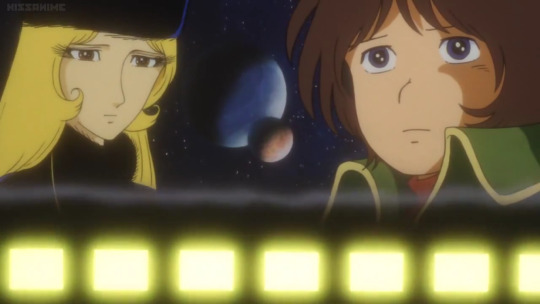
“Galaxy Express 999″, pronounced “three nine” because why not, is quite the space opera. I watched every episode of the original TV series as well as the two films directed by Rintaro and while they have some flaws or areas that did not age well, they’ve remained famous for a reason. The TV series did a really great job at pulling at your emotions and showing you different worlds. Some felt similar to others, but then there’s so much creativity in other areas. The concept of a space train was inspired by the popular Japanese children’s book “Night on the Galactic Railroad”, which would receive its own anime adaptation, and what Leiji Matsumoto did with this inspiration ended up taking on an identity all its own. You really feel for this bond between Tetsuro and Maetel. You spend so much time wondering just who Maetel is and what her goal in all of this could be. She’s kept just vague enough where I feel we were told all that we needed to. Tetsuro is someone I’ve seen reviewers describe as a little frustrating due to his naivete, but he’s a child. It makes complete sense for him to place his trust in the wrong person or make a mistake like he does. Masako Nozawa, the future voice of Goku and all his male relatives barring Raditz, voiced Tetsuro and I think she really brought a strong likeability to the character. We feel for him and also have a lot of fun seeing him travel through space. Its hard to say what version is stronger, I’d argue the show but know its not easy to recommend something that hefty. Whether someone watches the films or the show or both I think they’re still getting something great out of it.
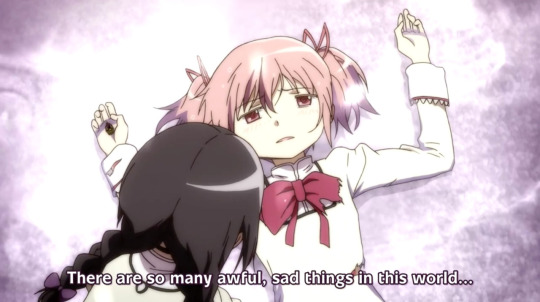
And they say you can’t sum up a show in one image. So “Madoka Magica” what are we to do about you? Its kind of hard to explain, but I rather purposefully chose not to watch it for this long. Mostly because I was tired of the hype and the fandom basically pulling an “Evangelion” and acting like no magical girl anime or manga prior to this served emotions. But its presence never really died, this anime is almost a decade old now and people still care. And while I don’t regret not tuning in while it was running, I am very happy to have experienced it on my own terms. It gave me one of my new favorite characters with Homura, its visually stunning and marvelously directed. the music is so enchanting, and the story really is good. I think the show from start to end was a great watch and really kept me going and the bittersweet nature of it did work for me. As far as the movies go I did watch “Rebellion” and while I think its good it does complicate what the message to the series is in my opinion. Either way its just the same as “End of Evangelion” where I don’t see it as canon. I think the big question a lot of people have is if this lives up to the hype and I’m not totally sure how to answer that, but it is an anime worth your time all the same.
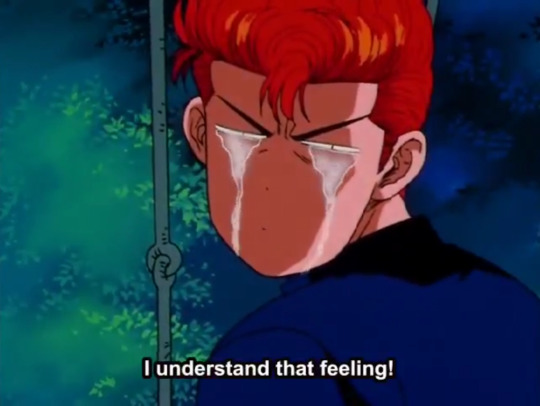
This will be easy. I have a review already written out for “Slam Dunk” so if you want my more expanded thoughts there you go. This really is a fantastic anime.
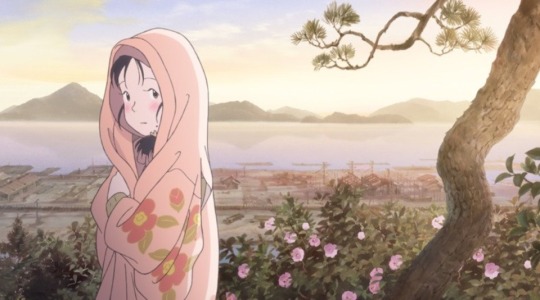
Last year I watched the movie “A Silent Voice”, but failed to put it in my year end review out of pure laziness. I am not making that same mistake again. “In This Corner of the World” is a film I am very grateful to have seen. Its a very interesting take on a WWII story. Not that we haven’t had movies about the war from the perspective of a civilian before, but there is something to the way its approached through our protagonist that feels especially powerful. She experiences so much during those years and tries her best to keep living with keeping her family alive as her main motivation and eventually is met with tragedy. Its produced by a studio called Mappa who’ve gained a lot of attention for “Yuri on Ice” and this year’s “Banana Fish. I did not like those anime very much, but I really loved this film and have to applaud them for trying different types of stories. I hope the projects they have lined up for 2019 are as enjoyable as this. I’ve heard the director has an interest in releasing an extended cut and if that happens I’ll be very interesting in seeing what it offers.
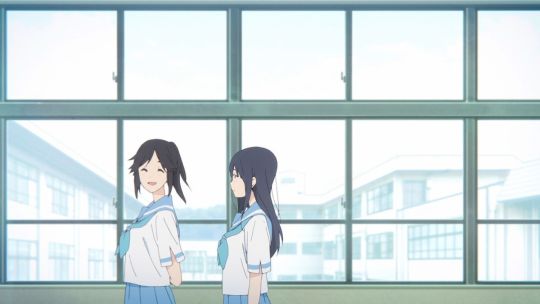
Again I will not make the same mistake twice. “A Silent Voice” was directed by a woman named Naoko Yamada. She also directed “K-On” and “Tamako Market”, two series that made it on my post for last year. She has an incredible talent and in my opinion is the director in anime to watch. After the success of “A Silent Voice” a lot of people wanted to see where she would go and what she gave us is nothing short of amazing. “Liz and the Blue Bird” is a film more people need to pay attention to. Those who’ve seen it adore it, fans have given it very high scores and glowing reviews. But I think this movie needs even more attention beyond that because compared to movies like “Doukyuusei” this feels like it made a smaller splash in the community. Yamada’s approach to love and drama is so effective without being forceful, you really feel for these girls and the longing between them. Yamada is a director who cares deeply for respecting the emotions of her characters which is why she has successfully created so many famous emotional scenes without them feeling melodramatic or feeling staged. This is especially clear with this film where she manages to communicate everything we need to know, but in very few spoken words. And the animation as one expects from a Kyoani project is just lovely. It also manages to work very strongly with its blue toned color palette. So many people make these blue toned movies look dreary, but not here. Things still have a brightness to them and even a warmth. I feel very lucky I was able to see this movie this year when so many anime films take so long to be made available elsewhere. When it reaches the US on bluray I am definitely buying it.
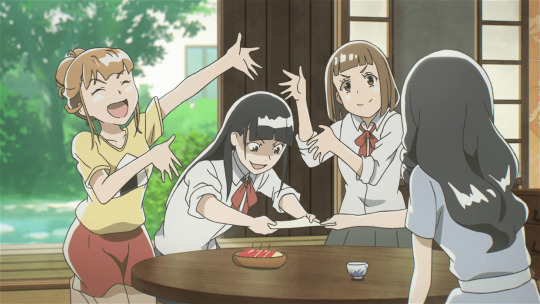
When it comes to the seasonal TV anime for the year, this was my favorite.”Sora yori mo Tooi Basho“ or “A Place Further than the Universe” is a very interesting installment in the “cute girls do blank” genre of anime. Here its cute girls go to the arctic. It sounds like a weird premise to a show, but when you see it put into practice its impressive how much you feel invested in these girls and what they’re doing. Its directed by a woman named Atsuko Ishizuka who was once identified as one of the great talents at the famed studio Madhouse. I think, like Yamada, she manages to work within these character heavy stories while avoiding any unnecessary melodrama. A lesser director would have made some scenes so cheesy or so over the top sad and that can take you right out of the experience. At first I was unsure of how big of a hit this anime would be given how many huge shows came out this year, but its managed to top the bluray sales in Japan for quite a while now. I feel really happy it became such a success. People say the cute girl sub genre is played out and that if you’ve seen one you’ve seen them all, that is not true. Sometimes you need a talented director, an off the cuff premise, and you can get something fresh out of a genre that sometimes over saturates the market.
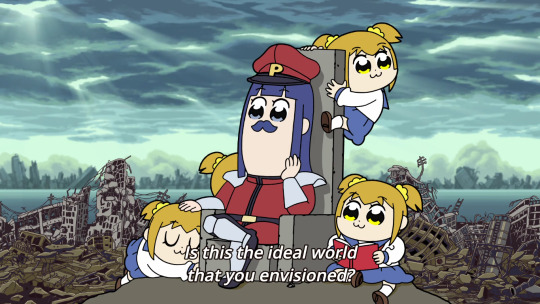
“Pop Team Epic” is an anime the like of which we’ve never seen before. And we will never get it again. A lot of people have said that in order to understand or get the jokes you have to know what it is they’re parodying and that really is not true. This isn’t referential humor like in “Gintama” where the impact of the joke relies on you knowing that material. If you don’t know "Jojo’s Bizarre Adventure” you won’t get it when Gin references Joseph and Caesar’s training with Lisa Lisa. Here the approach to the comedy is so surreal that if you don’t know the reference it just registers as a bizarre thing they did. Sure I know they referenced things like “Hikaru no Go”, but someone who doesn’t would just think its “Pop Team Epic” being weird again. And if you do know what they’re referencing then you know the layers to the joke. The anime is also in a lot of ways very visually strong to the point of being almost avant-garde. It was expensive and time consuming to make even if people don’t realize it. All of these different animation styles, the mixed media approach to certain scenes. They even brought in Miyo Sato, the woman who does the paint on glass animation for “Mob Psycho 100″, to work on the show for a few segments. To a lot of people this show was a meme, but in a lot of ways I think it was doing more than that. We’re not going to get another season or anything out of it, but I’m happy something this strange was able to exist and grab hold of such a large scale audience.
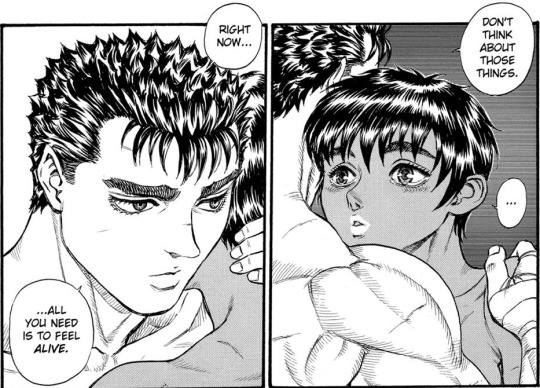
I have an in depth analytical review out for "Berserk”, if you would like to read such a thing there it is. However it does contain spoilers. My unspoiled and condensed opinions are that its fantastic, with gorgeous art, well developed and amazing characters, and tons of soul. Its very intense and not exactly for everyone, but its definitely a masterpiece. Unfortunately it also has a very foul fandom which turned me off reading it for years. I genuinely expected my review to garner a lot of negative feedback given how this fandom is, to my surprise this never happened though. If you can remove the toxic fandom from the equation, which is surprisingly easy to do, then you’re golden. Also this is a romantic manga and don’t let anyone tell you otherwise because they’re cowards.
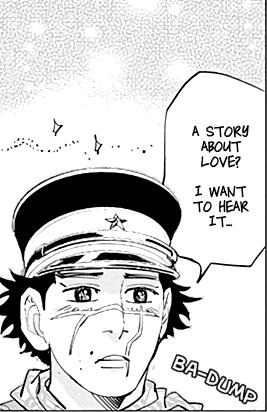
“Golden Kamuy” is fantastic as a manga. I watched the anime too, but I feel like that works best treated like a companion piece to the manga. I’ve best described the plot as “One Piece” meets “Silence of the Lambs”. This is also something that probably comes closest to evoking the same kind of strangeness that “Jojo’s Bizarre Adventure” has. The best way I can put it is that characters will say things that are weird, but nobody acts like they’re weird. There is also a lot of information fed to the reader about aspects of the Ainu culture and hunting and weaponry. At first it feels as if you’re being given a lot of information on topics that aren’t going to be important, but they end up having more significance than you realize. The same applies to the characters. I was surprised at how many characters I expected to be left behind were made relevant later on. And they’re memorable. Sugimoto, Asirpa, Shiraishi, Ogata, Tsurumi, Tanigaki, even that little girl Osoma was memorable. One thing the story really excels at is how you have a large amount of characters chasing the same prize, but with their own reasons. Nobody loses sight of their own motivation, some we still haven’t learned their true gain in all of this, and we see how this effects the flow of the plot. For such a large cast this would under a different writer feel very cluttered, but not here. And visually the manga looks amazing. Noda’s art is a little odd at first, but when you really look at it he’s got a lot of talent. Everyone looks distinct, the backgrounds look great, the animals look good (we’re not gonna discuss the anime’s CGI). If I had to recommend just one I’d say the manga as the anime does skip material, some due to networks being incapable of showing such things others honestly feel skipped because they wanted to streamline the plot at the expense of characterization and world building. I do still recommend taking in both as this sort of bundle deal though because the anime really is entertaining and has such a strong seiyuu cast it would be a shame to pass it by completely.
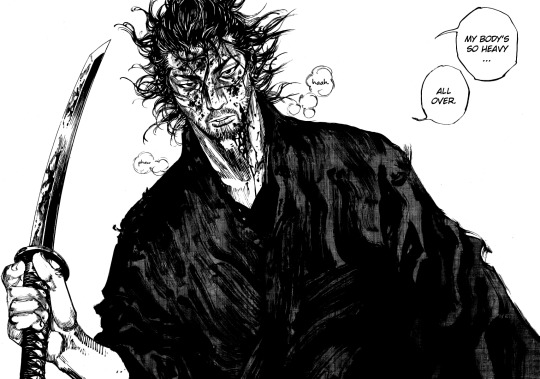
Takehiko Inoue is an absolute master at this stage in his career. In an interview with Akira Toriyama he was called someone with a real sense for manga and its amazing to see how he went from “Slam Dunk,” where he had not yet drawn a bare foot, to something like “Vagabond”. The art in this manga is deserving of all the praise it gets, its so detailed that it just leaves you stunned. The story also shows just how on point he is as a writer. I’m sure through the many movies and shows about Musashi Miyamoto a lot of Japanese audiences have a certain way they tend to view him and then here comes Inoue offering a different approach to the man. One where he is still working towards an enlightened state and trying to reign in an animalistic rage. Working in themes of being the strongest under the sun, what it means to live for the sword, how these choices effect the people left behind, its really fascinating stuff. There’s even an entire long stretch of chapters where we break away entirely from Musashi to focus on a young Kojiro and his adoptive father, its a very sudden break away yet it doesn’t feel random or jarring. I think because Inoue knows how to craft compelling characters so effortlessly it made that shift in focus work as well as it did. Its one of the most successful manga in terms of sales and with good reason, its a masterpiece. This is one of those manga that currently is on an indefinite hiatus and I can only hope Inoue is able to finish it. And if for whatever reason he can’t then at least we can say we got what we got.
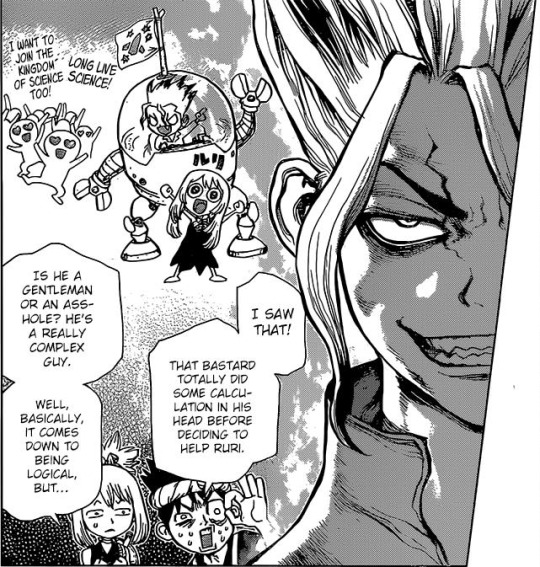
Behold your new shonen king! Not Izuku, not Hinata. Open your arms for the next great shonen! “Dr. Stone” is a manga that at the moment doesn’t have the largest of audiences, but everyone I know who’s read it absolutely loves it. And with the anime being released next year I can only hope that will be the push that people need to experience it. The story is focused very heavily on innovation and discovery which feels so fresh compared to a lot of things Weekly Shonen Jump has been producing as of late. And the level to which things have been thought out really impresses me. In recent chapters it was revealed that in that period of time humanity was petrified the terrain has changed drastically and the maps from the past are now worthless. So that means finding a way to survey the land and get a better sense of the world. Its so exciting to read this sort of thing. And the characters are so fun. Senku is a very interesting character to place at the center of this story. He’s a genius and approaches things as logically as possible, sometimes he can be a jerk and self serving, but he’s always going to do what he can to further civilization because he just loves science that much. Chrome is a really funny character to bounce off of him. We recently were introduced to a new member of the cast that has great potential. I like Asagiri. Its written by the same mangaka behind “Eyeshield 21″ and while I have not read that I can say through this manga that he’s really got a great sense of story telling. I also really like Boichi’s art, he pulls out some hilarious extreme faces and also some really dynamic scenes. Next summer can’t come fast enough because I am so hyped and ready for this anime to start.
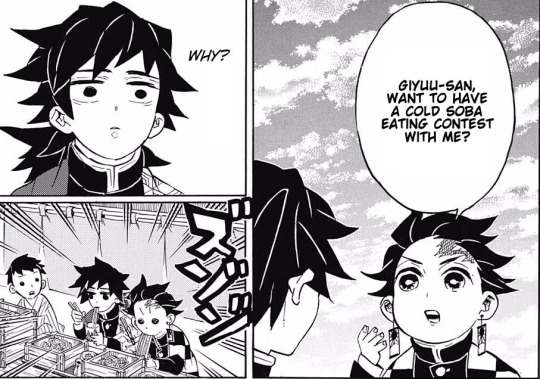
“Kimetsu no Yaiba” is another manga that will be getting an anime next year and I am extremely excited. If I had to compare it to anything I would honestly say its like if “Fullmetal Alchemist Brotherhood” and “Hunter x Hunter” got crossbred. Its mangaka Koyoharu Gotouge really feels very influenced by Yoshihiro Togashi in both her writing as well as some of her character designs. Togashi actually said this manga along with “Dr. Stone” is one of the ones in recent years to read which I’m sure made her thrilled to hear. I feel like this is something that does a lot of the things people generally want to see in anime and manga. You have a strong sibling dynamic at the center of the story (and it isn’t one of those relationships), there’s female characters that are involved with the action and its treated like a real fight, there’s themes of family that are always really endearing, aesthetically its very beautiful while still being able to pull off a more intense body horror style moment, fanservice aside from a couple moments is at a minimum, and it is also very funny. There’s a lot of personality to our main characters as well as the Pillars that we have gotten to know and it doesn’t feel crowded. She knows when to use a character and when to keep them out of a certain arc. She also has a lot of respect towards Nezuko who I feel another writer would have shoved aside in favor of her brother. But Nezuko is shown to still retain her autonomy in spite of her predicament, she fights and is sometimes vital to defeating a demon, and the more recent events in the story show a lot of potential for furthering her as a character. The anime is to be released for the spring and its made by Ufotable, based on the PV we have at the moment this show will definitely be gorgeous. I am very excited for what they’ve done with this material and I can only hope other people will be watching too because I do not want this to be a series people sleep on.
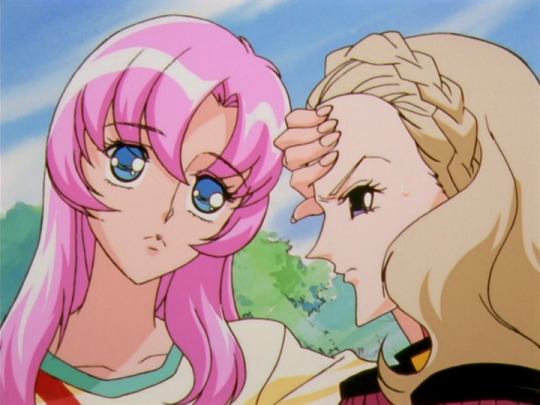
“Revolutionary Girl Utena” is a masterpiece. I have frankly a really complicated opinion of Kunihiko Ikuhara. A lot of people think he can do no wrong, I am not one of them. There’s things that happened with “Sailor Moon” that I know weren’t his fault, but there’s also things that happened during S where he had the most control over the project that still bother me. I can never know for sure if these were his ideas or things Toei forced onto him as he did leave the show because of a lack of freedom to do what he wanted, but that said when he really commits to a project he can produce something amazing. He has said many things over the years regarding Utena and a big takeaway from them is that he does not want to tell us what to feel, he wants us to decide for ourselves. I think what Utena fundamentally is about is deconstructing romantic tropes, analyzing chivalry, and the lies men tell women. The series gets more complex and symbolic as it progresses until we get to the movie “Adolescence of Utena” where its refusing to hold your hand any step of the way. Unlike with “End of Evangelion” or “Madoka Rebellion” the “Adolescence” movie is not an attempt at a different ending, but more of an alternative retelling of the story. Its a pure visual masterpiece and a movie that I honestly think deserves to be seen with or without the TV show. That said I would strongly recommend both of them as not only is it one of the greatest shojo ever, it is also Ikuhara at his finest. Moo.
1 note
·
View note
Text
Nine Worlds - Saturday
Friday found [here]
I got a full night’s sleep! I was still tired but it wasn’t too bad. I think I grabbed a nap at some point between panels but for the life of me I can’t say for sure when. Just that I really needed it. It was also the first day when I sat on or ran a panel.
ALCHEMY AND CHEMISTRY IN SF/FANTASY
This ended up being more about the history of chemistry and alchemy through time with a few examples of how it isn’t done accurately in either SF or Fantasy. Not what I was expecting, to be sure, but I still enjoyed it. I recognised a lot of it from a programme about the history of science and chemistry by Prof Jim Al Khalili on the BBC. The person presenting used to teach Chemistry and thus knew their stuff.
My only concern is that they said they were probably going to take longer than the slot assigned to them willy nilly like. Which. People have to get to things. Thankfully volunteers do pop their head in near the end of the slot if needed and it over ran a bit but not by too much.
Something that is important to note, and that not many realise but the presenter here made sure people knew, is that alchemy and chemistry aren’t that different in many ways. It isn’t like astrology and astronomy. Alchemy is where chemistry came from, like its ancestor, more than anything else, and there was this period of transition where it gradually grew from alchemy into what we realise as the modern day science of chemistry.
HARRY POTTER AND THE CURSED CHILD APPRECIATION
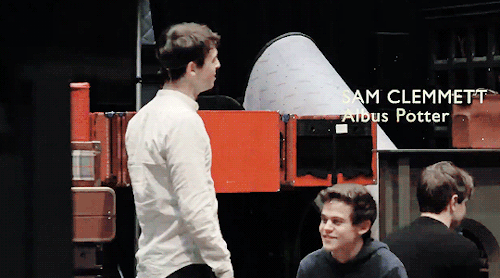
... behind the scenes footage of the first cast rehearsing the play. Clemmett as Albus and Boyle as Scorpius. Not in costume/wig but look at Albus glomping his best mate. Look!
I went to see this play when it was still new, when we had to keep the secret safe and before the script was published. I loved it. I remember the little girl next to me in utter awe about the stage as we walked in. I remember of the Dementor flying just above my head. The thump that got you in your core as time travel took place. Adoring Scoripus so so much. My heart breaking during the scene with Albus and Scorpius on the stairs, and with the cast at the end when they must let events play out. And I remember learning that a lot of Potter fans weren’t a big fan of the play.
So when I got an e-mail asking if I’d be willing to be on a panel about appreciating Cursed Child? I was all in. And when we were trying to figure out who would mod it I volunteered and so it began.
It was a great panel. Me who had only seen it, not read it. Someone who’d only read it. People who’d done both. People who know a lot about plays and how they work and theatre and the like.
We talked about the legacy of pressure of family, how that impacted Albus and Scorpius, and how there was these two stories - the kids and the adults. How we think it works that the characters aren’t these perfect adults and parents who do no wrong. Harry has a lot of trauma that the others around him don’t and that brushes up against the plot and also the needs Albus himself has. It’s messy and we think it works. There was also a lot of discussion around how it works as a play, how that makes it different from a book and the impact this probably had on reception. Play texts are fundamentally different from traditional prose and this can make it hard for those not used to reading them, who don’t know how to literally read between the lines. And we had huge appreciation for the stage craft from all sides of production.
I’m not turning this into a blow by blow of the panel. But there was a lot of love for the play. And considering this panel was up against the Black Panther panel? I think we did well. I am sad I didn’t get to go to the Black Panther panel but Nine worlds has not yet invented time travel so alas. I had a lot of fun, I hope others did too.
TOP OF THE SFF COPS

...tragically nobody mentioned Odo until I suggested him at the end. So I’m sticking him in here.
This panel is slightly infamous at this point, and going in I had no idea. Whilst I knew there were issues with a separate panel and a serving police officer being placed on it, I didn’t know this one would blow up. So far as I knew there’d been a similar one last year and I’d only heard good things. I also know that I have a lot of privilege being white and despite being queer I pass.... but I’ll go into that in a separate post later. Will post a link here when up.
A lot of genre fiction has police or security type characters in it. From X-Files to Star Trek to Discworld to Alien Nation and way way more. And like many professions who are portrayed on TV or otherwise intersect with it a lot (doctors, archeologists, writers, scientists) a lot of it isn’t done particularly accurately. So a group of people who work in law enforcement in various ways decided to do a session on which characters do their actual job best and in line with actual standards. It was made clear that they were there on a personal basis and not as an on duty or official representative type thing.
They put forth a set of criteria - things like knows the law, exercises discretion, compassion, does the day to day hard work and not just the action stuff and so on. Mulder? Is right out. Scully however was in, and the only character I recognised. So I was mostly went by who sounded the best and it ended up being the guy from Discworld who wont the vote. I don’t know the books well though so who knows. This was literally the entire panel. Still, I can see in retrospect how it would make some people uncomfortable.
It was an okay panel. I wasn’t expecting it to be a big vote thing, and more of a discussion type thing but in hindsight that may have caused more issues.
LET THE PAST DIE: SACRIFICING SACRED COWS IN STAR WARS THE LAST JEDI
This was put into a room far too small for what it needed to be. People were crowding in and it wasn’t great. Not long after it started a volunteer came in and offered up the room across the hall that had way more seating, so we voted on it and unsurprisingly we moved across. This would have been easier for some to do than others but it also have people who needed more space that space whilst letting people in. But it likely caused issues for those who have a harder time moving. I’d had a big dizzy spell on my way to this but seemed to be okay moving.

Part way through I decided to start live tweeting it and you can find that HERE. I’m not really sure what else to add but it was an interesting panel. Lots of talk about letting whiney fanboys whine to themselves, a lot of stuff they keep going on about was also in or also missing from the original trilogy. Nobody explained Palpatine until the prequel trilogy after all. He just turned up as a vague big bad when needed for plot. One panelist wished them the prequel trilogy ‘they deserve’ which amused me.
What I found most interesting though was a note on the green milk scene with Luke. I’ve seen people joke and deride that scene a lot since the movie came out. But one of the panelists, a woman from with roots in Hong Kong, said that it really struck a chord with her in relation to the diaspora. It reminded her of going into Tesco and finally seeing a noodle that isn’t exactly the same but reminds her a lot of something from home. And this was Luke claiming something that reminds him of where he came from even as he’s far away from it. It had honestly never occurred to me but it makes so much sense, and gives that scene a lot more value. I have no idea if the writers did that on purpose or if they did it as the easy joke though.
LAYERS OF MEANING: THE DIMENSIONAL DIFFERENCES BETWEEN ENGLISH, CHINESE, AND SIGN LANGUAGE
I loved this! This was hosted by a woman who was born in China and whose first language is Mandarin, but moved to Britain as a kid and later in life learnt BSL and now works as a sign language interpreter. She does this for Nine Worlds in various panels, as well as hosting a few sessions relating this to herself. And so she decided to do a panel that talks about her three languages as they’re all very different and go at language in different ways.
It was awesome.

...Mulan is not at all relevant but she is Chinese this is the best gif I could find that is both nerdy and has the writing system talked about in this session. And also, y’know, Mulan.
She isn’t a linguist, which she made sure everyone knew. But I think that made it work. It was also kinda amused because on the front row on one half of the aisle was a native speaker of BSL, and on the front row of the other half was someone who knows Mandarin better and I get the feeling probably came from a different part of the Chinese speaking world. But I’m just assuming there. And the interplay between the three was informative but also amusing.
I kinda knew the general concepts of what she was talking about. Or very vague versions of the concepts anyway. English is phonetic and the letters themselves have no meaning. D implies nothing when used in dog or door etc and it can be polysyllabic. Mandarin is logarithmic, it’s tonal and uses that rather than multiple syllables and it doesn’t have individual letters. The symbol for ‘female, woman’ 女 but as a radical can become a part of words like ‘calm/peace’ 安 which has the radicals for woman and home. Which, being at home is calming so I get that. There are also some not great words with woman as a radical too.
And then there is sign language which doesn’t have just the mouth to speak. It has two hands, your face and your mouth. It takes place in a 3D space and adjectives are often included as part of the word, not separate to it. You can say entire sentences with a gesture, and you pick up on ways of expressing things because they look interesting in the same way you’d vocalise something a certain way because it sounds nice..
It was interesting. I don’t know a lot about language, and anything too technically worded would have lost me. But this didn’t and this was another of my favourite panels this year.
THE POLITICS OF ACTIVISM IN MARVEL COMICS
So I don’t know a lot about the comics. I’ve read a couple Wolverine books but that is about it. But I thought I’d go along and listen cause it seemed interesting. Jaime was hosting it, someone who’d worked on the comics was meant to be there but had to pull and out and so Jaime was left by themselves but... Jaime did a good job.
A lot of the specifics were beyond me. But it seemed to be a common theme that activism within the comics would change the world too much beyond the baseline - a baseline that needed to remain stable. And a fear of how the much vaulted cis het white male would take it I’d imagine though I don’t remember that being touched on a lot.
I did comment at one bit. I tried to do a ‘I only really know the movies so maybe this is stated in-verse’ type of disclaimer and then was given what felt a bit like I’d been shot down with ‘comics only!’ despite others bringing MCU up before including by the mod. If they hadn’t, I’d have said nothing at all. But I may have just been a bit sensitive. In any case, I wondered if perhaps the characters did do things, within the parameters of their non-hero lives. Tony Stark is the CEO of a massive company after all, maybe he funds charities, treats workers well and make sure workers rights are a thing etc, invests responsibly. I dunno. And we just don’t see it much because it isn’t about punching people. I don’t remember a lot of what was said after that as I was too busy berating myself for daring to speak in a comics panel. Note to self, never go to one again, it is not meant for me. The vague idea I had about an X-Men as metaphor panel for next year? Likely wont submit that now.
But it was well moderated. People got a chance to speak, bounce ideas around and I think what I said was taken in as part of that. The session didn’t get stuck on one thing and it flowed through topics and ideas and the like and it was interesting. Except for that one moment I did genuinely enjoy it. Given the last minute alterations due to a key component having to drop out it was very well done.

... why do tumblr gifs all have to be so big?
DR MAGNETHANDS
This is kind of hard to describe, but it was very adult friendly, It had Captain Picard with swearing crashing the moon onto London, and Theresa May as a monster head fighting against a butterfly made out of lamb chops in some kind of anti-Brexit accidental metaphor. Especially as the lamb chop butterfly was a heroic character that Theresa treated as a bad guy. Everyone boo’d her at every turn.
It’s kinda hard to describe in any logical way what this session was like. Drawn off of audience suggestions and participation it’s basically crack fic made manifest.

... giant jellyfish in the sky didn’t happen, but were a distinct possibility.
It was just pure fun really. I laughed a lot, I had a great time, it was awesome.
SEX AT HOGWARTS
Another session that needed a bigger room. I got there pretty early and so had a good seat and then being a tad hyper I decided the room needed mood music. So I searched for romantic music in Spotify and played it. This is whilst the room was mostly empty and I did stop before the session started. Those who could actually hear it seemed amused. Not sure if it was at me or the music. And there were lots of tipsy people around.
We were also graced with Professor McGonagall who visited us and gave us all a good staring at.
Much like the late night panel on Friday, it was a pretty lively discussion with lots of absurdity and very clearly adult only. There was a sensible power point that combined info released after the books about who was dating who, comics and some parodies of what sex ed at Hogwarts might look like. It’s not what I’d have done but given it’s slot it worked out pretty well.
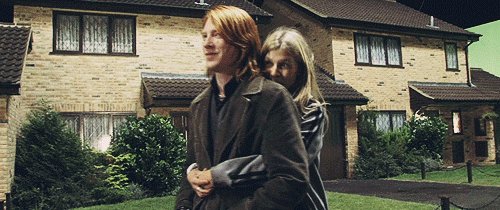
...given the topic, probably best to have a gif of adult characters. Also it’s cute.
There was discussion of what counts as bestiality in a world where all sorts of beings are sentient. I even posited the question that if someone kept up with polyjuice for nine months, could someone usually lacking a uterus become pregnant and give birth? This was laughed down and dismissed as it was meant to. Think it was kinda obvious in how I delivered it that I was being absurd. There was a lot of speculation of what portraits get up to and.... yeah. it was exactly as it sounds.
A lot of fun, and probably nothing teens haven’t heard or thought before but still, a good thing they weren’t there.
I’d have liked to go to bar and play Slash but alas, I was tired so I went to bed. Hoping for sleep and rather sad that the next day would be my last for another year.
[SUNDAY HERE]
5 notes
·
View notes
Note
Miss Grant...why did you become a reporter?
This question and Cat Grant’s answer were taken from the monthly-quarterly ‘Nine Lives Left’ column featuring CEO Cat Grant and editor of ‘The Trib’ Lucas ‘Snapper’ Carr. The column features questions towards both regarding journalism, ethics in the news industry, and–from Cat–fashion advice for the wilting middle-age ‘walking bearclaw’ editor taking said questions.
While originally edited in format and featured in the article, the below blurb was taken from the podcast posted on CatCo-.Co with the title of the same name.
So, Cat, everyone always wonders–I know, I know, we get asked this often–and I know we’ve discussed it over the years.
“Oh, of course, I love repetitive questions. If I hear it enough, it’s like the dulcet, soothing tones of Donald Trump.”
Why did you become a reporter?
“Hmm, yes, well–I’m sure you expect a wholly different answer, given the fact that I technically started in gossip.
Is there more to Cat Grant than high heels?
“If there wasn’t, you wouldn’t work here. Fine. A similar answer was in my excellently-written memoir, Cat Got Your Tongue released in 2002, but, in order to take you on a journey of me, Snapper, we’d either have to get you a fashion sense, or gussy up a handy little time machine and skip that awful hair-teasing, leopard print phase of the 90′s to go back to the book-worm days of my youth and, namely, the news as an influence–or lack thereof–of my formative years.
Below is the excerpt written by Cat Grant for the ‘editorial’ column, read and featured on both podcast and Trib header.
My father was a particularly knowledgeable man–a great man who had this air of regal mystique about him, or so it might seem to a young girl who had a habit of tiptoeing around the corners of an old, two-bedroom apartment in the bustling playground of Metropolis, before skyscrapers built like towering trees in the ground would become a far more commonplace playroom than my father’s study. But when I was a little girl, I enjoyed that air of ‘fine things’ that he seemed to carry–suits and cigars; mystical brief cases with work-related things in them. It’s all very fantastical to play make-believe with, if you’re ambitious, and while my age is a carefully-kept secret (soon to be given away by this article like an old CIA agent in a bar) there was a time when I did enjoy that long-forgotten art of playing.
As I tell my son, creativity is important–creating a rocket ship out of a box is the fundamental mind-set that will, one day, create a company out of thin air. It should never be repressed in a child, and I often found myself tempted by the utter adulthood of my father’s study like a creativity landmine.
The door was always locked save for Sunday mornings, his coffee creating a fine brown ring along whatever ever-present newspaper had found its way to mahogany that morning–the business and politics sections the first read and neatly folded to the side. Saturday morning cartoons were not something my radical mother appreciated in the mornings, but both of them could be seen feverishly discussing current events over the sounds of a crackling, small television in the corner. Only on Sundays, of course, they were feverishly discussing far less important things every where else at much louder–far more grating–volumes everywhen else.
It wasn’t uncommon to hear the soothing sounds of Walter Cronkite (prior to Dan Rather and Connie Chung’s overruling domain in my mother’s household) in my youth and this particular day, there was one singular, titular program on the television.
Fortunately–as is an American right–the magnitude of war was lost on me at such a young age, and I had the benefit of merely being fascinated by war like it was some distant, fantastical teleproduction. Like H.G Wells was narrating events, materialized with sensationalism and haunting faux-realism–like I was always one step removed from its horror, because I was.I wasn’t aware of this at the time–what little girl would be?–but Nixon and Johnson ordered the bombing of the Eastern Cambodian line in order to usurp the then-communist Vietnamese strongholds. I wasn’t aware of the impact this would have, ultimately, on the American population–peace signs and drugs and love not war notwithstanding–but also on the Cambodian people.
For four years, with as many visits as an estranged aunt appearing solely for family functions that no one particularly wanted to invite her to, but she just obnoxiously showed up anyways–similar to Joan Crawford, the later years, at a party or Joan Rivers at your wedding (three times)–only to make one small, forgettable appearance, I learned of my first taste of media’s role in education the masses–
By learning that media was not educating the masses.
From the time I was nine to the time I was thirteen, the Khmer Rouge regime, under the daunting, fanatical leadership of Pol Kot, committed the systematic genocide and elimination of approximately three million Cambodian people under the name of Democratic enstatement in the country. I heard the word Kampuchea (the government created by this regime after the slaughter) feverishly whispered around my father’s coffee mug like a dirty word–like that salacious affair my mother heard about the neighbor having with his nanny–and never understood the impact of it. It wasn’t discussed in my school and, save for a quickly-buried news report every week or two, it was lost, like some lack-luster movie hitting the box office, watched by a hundred thousand people never to be heard of again.
It was a transient sensationalist story. I didn’t understand the gravity of what occurred until college and the magnitude of such a death toll never truly touched Western newspapers save for blurbs. Not even in 1999, when Nate Thayer and Nic Dunlop interviewed a member of the regime’s command still awaiting trial. The story was picked up, ran once, and everyone’s fickle minds forgot about it come Monday, while the weight of the death toll was still being felt by the country to this day.
It was a systematic oppression of the people–a slaughter of a race and religion–and in my twenties, when someone mentioned it, as historical fact, an event that cost the lives of millions, I furrowed my brows like it was a word I couldn’t quite remember on the tip of my tongue.
Lost.
In the 90′s, I was far more educated and politically forward–I was nicknamed Hanoi Cat by a few particularly close friends (one of whom is on the ballot for president this year and should think wisely about the things that a girl might remember to blackmail her with)–and it wasn’t uncommon for me to be enraged by the cruel, cruel state of the world.
Oh, I taped myself to trees in political outcry, usually hungover and in fabulous heels on a budget, before my palette for social change and fashion had both fully refined. I screamed at rallies and bemoaned the effect of war on the world while sleeping in my thin dormitory mattress that I thought toughed my spine into steel. I was war-torn and affected by the weight of the world’s decisions, unlike my unassuming friends and colleagues.
I’ve since grappled and come to terms with the fact that complacency within a world is a fallacy: ignorance of people assuming the blame doesn’t lie on their shoulders; ignorance of people assuming the blame solely does. Change is not as simple as strapping yourself to a tree and screaming about indignancies.
I’ve also since made it a point to buy better mattresses. A girl needs her beauty sleep to change the world, after all.
The Rwandan massacre was far more documented, at the time, than the Cambodian massacre was in the 70′s. But To some of you, who are about to swiftly make my own point about a disassociation of connection and responsibility for me, you might have furrowed your brows and wrinkled your nose at this very paper.
I’m sure it’s a fabulous look on you.
Perhaps you saw the movie with Don Cheadle in the early thousands–Hotel Rwanda–where the gripping dramaticism of it all might have dampened the weight of the events with Hollywood flare–provided a sense of detachment that comes with all things sensationalized. After all, how do we, as a society, come to terms with the deaths of a million people? Another genocide and, though the emergence of electronic media made it far more televised, this one became just as forgotten.
For a minor history lesson–don’t worry, I’m sure many of you have that hot for teacher fetish–let’s recap the events of the Rwandan conflict in a short, small, haunting blurb that does nothing of justice to the weight or impact of what occurred: in 1994, due to the loss of a political leader, over one hundred days, an approximate million Rwandans were killed by militias and the military under order of the interim Rwandan government.
The coverage of the event was minimal, at best, and the focus of most media outlets–save for a steadfast Perry White who I will credit with having a great focus on human rights, even if the Planet is a subpar paper in every way to ours thanks to one Lois Lane’s lackluster writing–was more on evacuating government officials than on the genocide.
Questionably as appalling as the genocide–in a moral way that, to a journalist, rivals the death of a people–was the treatment of the genocide after the fact. The Rwandan Patriotic Front followed the interahamwe and the Hutu-dominated military into Zaire (what is now called The Democratic Republic of the Congo) and pillaged–that’s slaughtered and raped for those unfamiliar with coy terminology–their way across the eastern part of the Congo. Two years later, Zaire was once again invaded and a puppet government was installed. When that government crumbled, the government once again ransacked the country like some sadistic Santa Claus stumbling in through your fireplace to devour all of your cookies. With a hint of a Krumpus flair.
These actions caused a total death-count of around five-million congolese people.
None of these actions were adequately covered in the news.
So what does all of this have to do with me being a journalist? Oh, I have a point–trust me, I always have a point. Maybe I’m still a writer, through and through and it might be lost in the superfluous overzealousness of my ideas, but there’s always a point.
I became a reporter for one simple reason: to find truth.
Were there news stories surrounding these events? Of course. Coverage might have been ill-focused during the time–far more for the Rwandan genocide than the Cambodian, though that could be attributed to the times and the lack of such a fine political conscience that Americans carry with them, today–but it was covered. But these moments are forgotten.
Lost in history.
A girl with knit eyebrows, forgetting the effect of war and conflict in a country so far away from my own.
Not only were these events transient in the media–not only did I watch them fade underneath the fickle eye of the current press with no lasting coverage or true understanding of the events that took place–I watched the media effectively suppress information.
Stories need to be told and information cannot be suppressed. What do both the Cambodian massacre and the Rwandan genocide have in common? The same thing any government needs in order to systematically commit atrocities against the Geneva Convention–the same thing anyone needs to commit a crime against humanity, big or small: silence.
Cooperated silence.
These governments silenced the media within their countries. They controlled the information flow so tightly that there was only one story that was ever told and a lasting embargo was placed worldwide over these events to not endanger the lives of any officials left in the war zone.
No one was talking about it.
The moment a government starts oppressing speech–the moment the government takes away a people’s voice is the same moment they ultimately take away their humanity.
Their tie to the world is cut.
How would you feel? In the land of the Great, if we were slowly starting to be distorted–cut off from news, from information flow. If stories of truth turned to ‘stories that the government told us’ which, ultimately, lead to global news of stories of what the government said, since there’s no other form of information available…would you feel safe? Would you feel safe being involved in a ‘He Said’ ‘He said’ with Big Brother?
Oh, I can hear the rackling shackles of Republicans even while I’m writing this, but it’s not political–it’s human.
What would have happened if one voice in a sea of millions fought for their right to be heard–fought for their right to exist? Is it likely that millions of people might be alive, due to one voice? Oftentimes, political stressors are overwhelming–we’re led to believe that we’re cogs in a system, barreling out of control.
No. Oh, no–no. Fake. News.
I’m one woman and I have, a will continue to make a difference, and so can you.
That is why it is so important that we have not only a global conscience–but a global presence in the world–humanity is not just a contained problem that happens on the other side of the globe. It is not just a number on a scale of millions dead. It is a problem that could someday affect us and already should simply from the ethical position of allowing it to happen, in the first place.
I don’t say all of this to endlessly guilt you. I believe there’s nothing wrong with taking joy in the finer things in life–in indulging in the good things, instead of just entrenching yourself in the bad–and, like I’d earlier informed you, I do have a nice mattress. I’m not a pauper constantly toiling away underneath the stress of the hedonism of humanity.
But I do stay informed–I think it is my duty to stay informed, just as I think it’s yours–and, furthermore, it’s my duty to inform you. To tell you the truth with integrity and steadfast objectivity.
It is my job to ensure that you cannot be blinded by the ‘fake news’ of the world.
Perhaps I don’t tie myself to trees anymore, and my heels are far more upclass, but there’s still a fire of injustice within me. I think there is for anyone who’s masochistic enough to persue the truth of the world because, oh, it can be cruel. And it can be abhorrent. And human nature can be so bone-crushingly haunting that it aches–it leaves a hole within you where humanity used to be–but there’s a brightness to it, as well.
There will always be people who fight, if you give them a cause–there will always be hope to survive; to push past; to assist those who have been faced with atrocities–and that’s why I became a journalist. To give them a voice. To give them a light.
To give them a choice to fight.
I became a reporter to give a voice to places that no longer have a voice–to make these stories have a lasting impact of relevance and to question not only my own complacency with silence, but to challenge the world’s. It is far easier to ignore the atrocities of the world. It’s far easier to pretend that war is non-existent and that we hold no part in it, if it’s not on our soil we don’t have to handle the short and long-term effects as someone in the country might.
But humans haven’t survived because we’ve had it easy–we’ve survived by building communities. Fostering innovation and pushing together, ultimately, as a society.
Any cruelty the world faces, I will do my best to ensure that people don’t furrow their brows in forget a few years later–instead, we can all rise up against them, history that steel in our spine molded by information, not a rusty old college dormitory bed, and proudly proclaim:
Not again.
This article was published and hosted by CatCo Worldwide Media; edit et al: Lucas Carr; feat: Cat Grant; CatCo WW M - 2015.
#about cat#questions#tw: long post#tw: genocide#tw: news#tw: fake news#//I have a lot of feelings about burgeoning 80's 90's cat grant the reporter#//the woman who went to Kahndaq and helped found a media empire in order to showcase the global atrocities and goodness of the world#//thank you so much for this question I'm so sorry it took me so long to answer
3 notes
·
View notes
Text
Yunnan and Sichuan Dreams

I was sitting in a noodle restaurant in Shanghai, one Saturday before we were set to leave for this legendary trip when I started coughing. It’s no big deal, I reasoned, these peanut butter noodles are spicy and there’s pollen in the air and plenty of smog, so surely the tickle in my throat is only that, nothing sinister. We live in a fair world, so there’s no way I could get a cold right before the amazing trip to the Yunnan and Sichuan provinces I’ve heard so much about.
It was a nasty cold, and I was banished from the trip.
I spend a week and a half alone, healing slowly, drinking buckets of water, and dreaming of the adventures my classmates were having. I was healed when they returned, and I eagerly cornered them and demanded stories. I began with Kate and Emma, shoving my phone in their face as we waited for our noodles.
Kate Yachuk: We talked to Professor Wang, I think, and he told us about the last living hieroglyphic language in the world, which is spoken by thirty people, of which he is one. He was one of the Yi people, he was super friendly and very knowledgeable. And he brought us to his house and gave us lots of candy!
Now, ask any Tom, Dick, or Harry, they’ll tell you how much I love candy, but what I love even more is linguistics. It drives my friends insane, but I’m proud of how truly nerdy I am. One of the main, nerdiest reasons I was so gung-ho for this particular field trip was to personally observe the culture of the Mosuo people, one of the last matriarchal society in the world, with whom I have been fascinated since I was ten years old. The Mosuo live around Lugu Lake, and Emma gave me the briefest of fill-ins on the matter.


Emma Barker: So, since we had to turn around and not go to the Tibetan village, we had to pull some strings, I think. We were going to the Lugu Lake anyway, but we had extra time from the change of plans, and Liu Wei said he had a friend nearby. We went and visited her house and talked about her culture and then we visited a monastery. We walked around there and were shown around by some monks and a living Buddha. Then we went back to this lady’s house and she wanted to dress us up in some traditional clothing; first we dressed up Zack and Samudra, then we roped Lyric and Liu Wei into doing it too. Everybody looked really good!
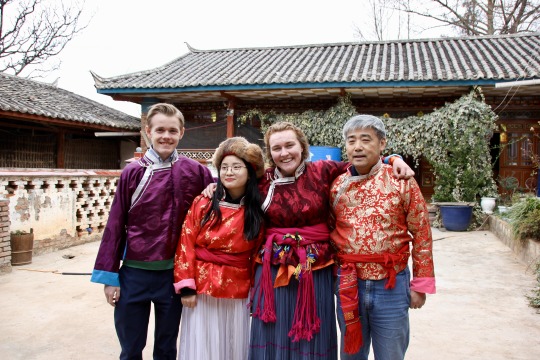
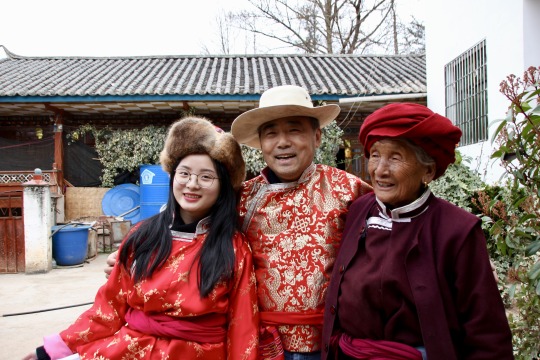
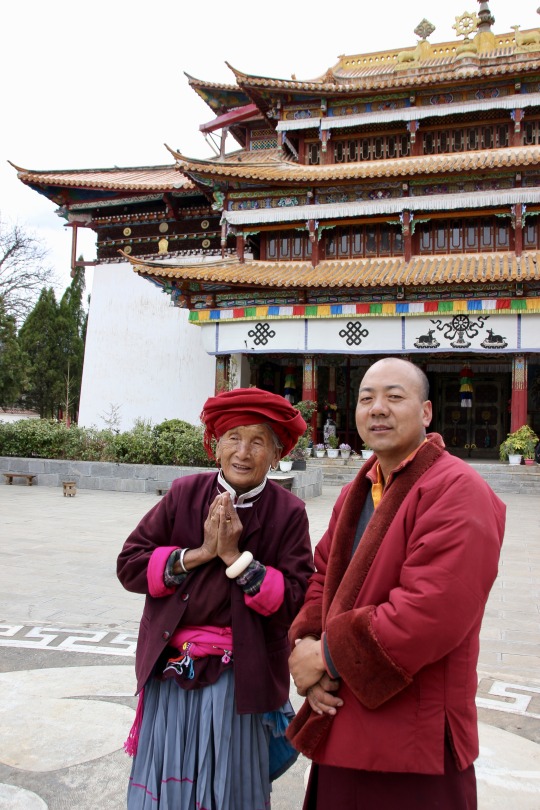
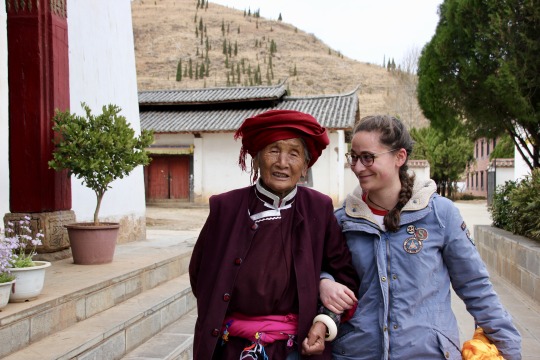
Jealous as I was hearing of Emma’s adventures, I continued to seek stories of the trip. I knew, from years of Global College field trips, that the programming frequently outshone the way it was described on our itinerary, like the way the performance in Taiwan was explained to us as mere children’s theater. Sophie confirmed my beliefs.
Sophie Gagnaire: So, on the trip we met this Naxi woman and she took us to a monastery where her brother works, where we met the living Buddha. I was really blown away by how decadent and extravagant it was. The monastery was in this compound that also had a four-hundred-year-old building, so we got to see these original wall paintings from four hundred years ago, and this massive, thirty- or forty-foot Buddha statue. It was amazing!
One of these things that most clearly marks a Global College field trip is the last-minute adjustments. It is not that Global is unprepared; quite the opposite, in fact. It is rather than a field trip of this nature, twenty foreign students attempting to experience something meaningful in the same place, year to year, lends itself to mishaps and unexpected schedule adjustments, and Global is admirable in the way in which it adapts to such itinerary shifts, and the way in which its students learn to adapt and participate.
Santiago Sanchez y Lucero: So, we drove seven hours into the mountains to make it to the Tibetan region [of Yunnan province], and about six hours in, we ran into police officers who told us that we had to turn back because we were arriving on the tenth anniversary of an uprising that was orchestrated by American student. We seemed like a suspicious group, which I guess is fair.
I caught up with Nicole after I spoke to Santi, asking if they ever did come into contact with Tibetan culture. We were all, at least in our late-night pre-trip debates, keen to engage with Tibetan culture, given that this may be our only chance. We are, after all, a crew of liberal arts students from the United States filled with radical ideas and a truly American inability to censor ourselves when it is appropriate.
Nicole Price: I forget which day in the trip this was, but it was a few days into our trip, and we visited a university where they have an entire portion dedicated to Tibetan language and culture. We got to see their archives of Tibetan language and culture, and also other minority languages that have almost died out, like the Yi language. It was really cool because we got to enjoy a perspective, through these archives, that not a lot of people would have access to. It was exciting to see in practice the things we had been learning about all semester.
Now, Global field trips are, first and foremost, about learning; after all, we wouldn’t be going into this much debt for a degree if we weren’t being provided an excellent education. Still, I spent most of my childhood at summer camp, and I have noticed some close similarities between a day at camp and a day on a Global field trip. Many similarities are superficial, such as the odd sleep schedule, unusual group activities, and the way you seem to fit more into one day that you would fit outside of camp/field trip in a week. What stands out the most, though, are the ability you develop to adapt, at lightning speed, to adversity, and the degree to which you bond at dinner time. At camp, social life revolves around the dining hall, and in the mountains with your Global classmates, you feel the most like a wonderful family when you’re swapping food and stories and recounting your day over more food that you could ever finish. Courtney-Lynn agreed wholeheartedly.
Courtney-Lynn Mellina: My favorite group dinner from the Yunnan trip was the Tibetan-style dinner we had with the living Buddha and the rest of the class. It was, by far, one of my favorite dinners in all of Global, and the food was spectacular! I made some new Tibetan friends, we had great conversation and I tried foods I had never tried before It was a real sense of community that I’m so glad I was a part of.
Now, in spite of certain commonalities, every trip is different. I love taking the things we learned in the classroom out into the field, and I know many of my classmates feel the same. It’s always exciting to find a new way of learning, exploring areas made accessible to you only by the luck of going on the trip; I hope my jealousy isn’t coming through in my writing, I’m not bitter, I’m fine, everything is fine. Sophia and I caught up over dumplings.
Sophia Cox-Wright: One of the highlights, definitely for me, going on this trip would be that, because of scheduling matters and some things, logistically, that just ended up not working out, which kind of just happens sometimes on Global trips, we got a bit more time to just hang out and be alone. It gives you a chance to just learn from the place that you’re in. For example, one of the things that I really enjoyed was going in to the town square in one of the villages and just sitting there and watching the tourist trade and Chinese tourists. It was interesting seeing the effects of it, if that makes sense, and seeing it for myself instead of just reading, trying to integrate myself into that space. That experience is definitely something I’m going to be thinking about for a while.
As I gathered these stories, both for the purposes of writing and personal gratification, I couldn’t help but compare them to the looks on my classmates’ faces when they returned and my own past experiences. This trip to Yunnan and Sichuan provinces was as intense an experience as promised, and like any field trip, the best and the worst part was coming home. After all that you learn, you just want to be somewhere comfortable to process it, even if that means leaving beautiful new places you have become attached to. By taking part in the post-trip emotional processes of my friends, I enjoyed the trip in my own way: vicariously. Until I have time to visit on my own, that will have to be enough.
by Julia McCoy.

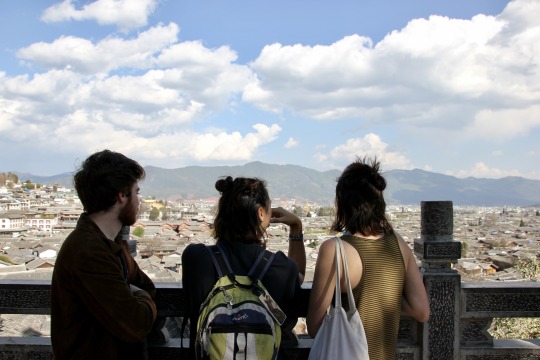


4 notes
·
View notes
Text
Back from the brink, Dylan O'Brien is ready to prove he's an action hero
or the past year, Dylan O’Brien has been in hiding. He spent most of his time inside his home in Sherman Oaks, wondering if he’d ever be the same person he was before the accident. Not just emotionally, but physically too: After major reconstructive surgery that left him with four metal plates holding one side of his face together, he feared he’d never look the same again.
“It’s a miracle, what they’ve done,” O’Brien says, placing his hand on his cheek. Indeed, the actor’s team of doctors must have done some incredible work, given the fact that he looks almost exactly as he always has — the boyish teen heartthrob who has amassed an army of young female fans since he began working on MTV’s “Teen Wolf” at age 18.
Of course, he’s 26 now, so he’s filled out a bit, and there’s also a hint of patchy scruff on his face. He had enough gravitas to him that the producers of “American Assassin,” which opens nationwide Friday, felt confident casting him as the grizzled action-hero Mitch Rapp — even though the character in Vince Flynn’s bestselling books was widely believed by readers to be in his 40s.
“American Assassin” is the reason O’Brien emerged from his self-imposed exile. He’d signed onto the film just a few weeks before he began work on “Maze Runner: The Death Cure,” the third and final installment in 20th Century Fox’s post-apocalyptic young-adult franchise. He was hoping “Assassin” would mark the beginning of a new period in his career. In 2017, after six seasons, “Teen Wolf” would come to an end, as would the “Maze Runner” series.
“I’ve never looked at myself as this pop candy type,” O’Brien says, peppering his speech with more colorful language. “I felt like I was more real than that, so I would get mad when someone would say [I was a teen heartthrob]. I’d be like, ‘I’m 19! I’m a stoner!’ I really resented that.”
He was so excited to begin work on “Assassin” that he fielded calls from director Michael Cuesta just as production began in Vancouver, Canada, on the final “Maze Runner” film. Together, they discussed how O’Brien would approach the character, a 23-year-old who is recruited by the CIA to hunt down terrorists after he witnesses his girlfriend’s murder at the hands of Muslim radicals.
“I spoke with him on a Saturday when he had just started ‘Maze Runner,’ addressing his notes and concerns about the character,” Cuesta recalls. “He was really excited and seemed like, ‘Yeah, I’m ready to do this.’ I was like, ‘Pace yourself, dude. Take it slow. We’ll talk when you’re off this project.’ That was Saturday, and on Wednesday, I got a text from my agent telling me that this awful thing had happened to him.”
On the third day of production in Canada, O’Brien was performing a stunt that required him to be harnessed to the top of a moving vehicle; reports claim he was accidentally pulled off that vehicle midstunt and hit by another vehicle. As a result, he suffered “a concussion, facial fracture and lacerations,” according to a report from WorkSafeBC.
Fox put production on hold in March 2016, and O'Brien ultimately returned to set a year later — after he'd shot "Assassin." “Death Cure,” which was originally scheduled to open in February of this year, is now set for release Jan. 26, 2018.
“I didn’t really wake up or become cognizant, in a way, for a good six-to-eight weeks after it happened,” O’Brien explains. “And then I entered a really difficult phase. I just wasn’t the same person. Things happen to you after something like that that you just don’t have any control of. Your body is designed to react in a way to protect itself if you have a severe trauma to your brain.”
The actor is sitting at a hotel bar in late August, publicly discussing his accident for the first time. He’s been anticipating this day for months. He knew how it would go, meeting reporters at the Four Seasons in Beverly Hills, where he’s done press a handful of times before. Even though he was supposed to be talking about “American Assassin,” he’d also have to talk about what had happened to him.
“I hid for a long time, obviously. I was going through a lot and didn’t want anybody to see me going through that, I guess,” he explains. “But I’ve gotten to an OK place of talking about it all. I’ve had to come to terms with people asking me about what happened.”
In a way, he admits, he regrets being so private about what happened to him, given the rash of recent on-set stunt-related injuries and deaths. Last month, stuntwoman Joi Harris was killed while riding a motorcycle on the set of “Deadpool 2.” In July, a stuntman on AMC’s “The Walking Dead” died after falling and suffering massive head injuries. And actors have been harmed too: Tom Cruise broke his ankle while attempting a jump from one building to another on the set of “Mission: Impossible 6,” and filming had to be halted in August. And on the sets of two different comedies this summer, Rebel Wilson suffered a concussion and Ike Barinholtz fell from a high platform, fracturing two cervical vertebrae in his neck.
“It’s really disappointing, and I think things like that should really wake the industry up,” says O’Brien. “It’s really easy, sometimes, to get comfortable on a set and get into the groove and think it’s all make-believe so nothing bad can happen. As an actor, you blindly put your trust in experts — and if they tell you something’s safe, you don’t fully vet it yourself. If you’re young and inexperienced, that’s just what you’re taught to do.”
While he never felt like a “gun was to [his] head,” O’Brien admits he always felt responsible for performing his own stunts. He’d get upset any time he had to be replaced by a stuntman. When he’d watch one of the first two “Maze Runner” films and catch a shot of his double, he was irritated.
“It bugs you,” he explains. “You see it and you’re like, ‘Ugh, what the [heck]? How do people not notice that’s not me?’”
But if he knew if he was going to move forward with “American Assassin,” he’d have to approach his action sequences with far more caution than he ever had before. Once he decided to stay with the project — and CBS Films, the production company behind the movie, agreed to wait for him to fully recover — he began working extensively with action coordinator Roger Yuan to ready himself for the movie’s hand-to-hand combat scenes.
Not surprisingly, O’Brien says, there were strict parameters set in place by the film’s insurance company that dictated just how much he could do himself in the wake of his accident. But he was still eager to do the fight scenes himself, so he rehearsed them extensively — to the point, he says, where he literally could do the choreography blindfolded.
“You just want to know it to that extent so that everybody knows what they’re doing on that day,” he says. “And then when you get to that day and somebody says, ‘Wait, can we just change this?’ You say ‘No.’ Things like that, you’ve gotta stand up for. I’ve understood more of where my voice can exist. When I was younger, I used to just want to please everybody and not want to be an issue or not be considered a diva. I’ve just grown up and realized you have to look out for yourself and stick up for yourself and there’s nothing wrong with that.”
Other protections were built into the production to make O’Brien feel more at ease too: His father, a veteran below-the-line staffer, was hired as a camera operator so he could be there if needed for his son. And “on the days we were putting Dylan in a situation that might make him uncomfortable, we took longer than we might normally take because we didn’t want to rush it,” says producer Lorenzo di Bonaventura. “We were acutely conscious of not putting him in a situation where he could have an adverse reaction — a stunt that might rekindle something.”
O’Brien had also spent time readying himself mentally for the return to set even before production began, visiting with a therapist two times a week. It was there that he realized the similarities he now shared with Mitch Rapp, a character struggling to contain his anger in the wake of a serious trauma.
“It felt like this version of me at the time, always trying to hide from people,” he says. “I was in a really dark place. Obviously, I didn’t experience what he goes through, but that summer when I was in recovery, I was going through a lot. Funny enough, I felt so deeply connected to the dude, and I don’t think I would have known how to play him if this hadn’t happened.”
Meanwhile, it remains to be seen whether “American Assassin” will be the role to catapult O’Brien into adult leading-man territory. His young female fans are still ravenous, anyway: On set in Rome, they once became so intense that the actor was forced to move to a different hotel.
“I saw some fans outside afterward, and three of their moms gave me the finger,” says Cuesta with a laugh. “They hated me because I was keeping Dylan from them.”
The producers of “Assassin” are hoping the film does well enough at the box office this weekend to launch a new action franchise. O’Brien knew that was a possibility, and says he’d be happy to play Mitch Rapp again. But he’s also looking forward to doing something smaller — “finding the new generation of filmmakers and taking risks on guys who don’t have a 25-year résumé.” The idea of acting in a Marvel superhero film, he says, makes him shudder.
“It just seems like too much,” he says. “I don’t think I’m a person who could handle being that face, that star who has to be on every talk show every year. It gives you a lot of flexibility and freedom in things that you do want to do, but it also takes a lot of your time away. And just artistically, it must be hard to keep suiting up and be the same character again over and over all year long in a bunch of different movies. I would like to have a lower profile and career, in a way, but still do things that mean something to me.”
He’s proud of his work in “Assassin,” he says, but he almost doesn’t look at it as a movie.
“It was everything but, in a way,” he acknowledges. “Look, I was angry for a long time. But at this point, that’s not going to do anything. I have to process what happened and move beyond it, and I have. It was the worst thing that ever happened to me, but it’s provided me with a lot of growth and insight that I wouldn’t have had otherwise.”
[source: LA Times]
#dylan o'brien#mitch rapp#american assassin#amas#article#la times#accident#recovery#scruffysterekposts
111 notes
·
View notes
Text
HMB: Stranger Things Season 1
Original Publishing Date: August 6th, 2016
It's the Netflix show that's taken the world by storm, earning universal acclaim, hailing as one of the best shows Netflix has ever produced, but I'm sorry to inform you all... But I have to take a generic stance on this one. This show... Is amazing. One of the best written shows I have ever seen. Because of it, I've decided to dedicate this Thursday Horror Movie Blog to talk about it. Even though it's not a movie, nor is it technically horror, and I'm posting this on Saturday. Whatever, let's dive into it. Stranger Things takes place in the 1980's and is about Mike, Dustin and Lucas, three young nerdy kids who's friend Will goes missing. After Will's disappearance, a young girl named Eleven pops out of no where, coming across the boys, who has psychic and telekinetic powers. We also follow other characters such as Will's mother and brother, the sheriff of the town, Mike's sister and her missing friend, and the big, bad government who is looking for Eleven. As you can tell, this show is a mystery, as we are trying to piece together what is going on. The show is able to balance exposition with emotion, meaning there's never a moment of forced exposition nor times where a character's emotions feel unbelievable. Much of that is thanks to the amazing acting of, not only the adults, but also the children. As you might already know, child actors usually give bad performances, which is why it's amazing to see one that clearly isn't scripted or phoned in. All you want to see is these kids getting their friend back, and that's largely due to the performances these kids gave. Eleven, despite only giving single, small sentences, manages to win your heart just by her acting. But the best thing I can say about this series is how well paced it is. Telling a mystery means a lot of time needs to be taken for build up and pay off. Red herrings, suspects, assumptions, all these things that could fill up a book, but are limited in traditional TV. After watching this series, I found out that this show was actually rejected by 15 studios before being picked up by Netflix. The radical young writer wants to blame clueless executives who just want to make money, but honestly, this type of series can only be told through Netflix, or online media. No commercials (at least not in the traditional TV format), all the time the film makers need (in this it's around 50 minutes, something you can't do on TV), and all the episodes that's needed to tell the story (8 episodes including the large opening). Something like this would not fit the TV format, it needed to have all space it deserved. So yes, while it's frustrating to know that a series as amazing as this was rejecting by so many TV studios, it's refreshing to know that we live in a time where creative voices can be heard and we are no longer limited by the formatting of TV. Honestly, there was only one home for this series, and it was Netflix. Now let's cover the characters. Our main characters are Mike and Eleven, but we also spend a good chunk of the time with the sheriff, Will's mother, Mike's sister Nancy, Will's brother Jonathan, and other characters. This show was deeply inspired by 80's culture, specifically Steven Spielberg movies and Stephen King books. In fact, there's countless references to the two, from someone reading a Stephen King book, to a poster of Jaws in one of the boy's rooms. Why is this important? Because the 80's come with their own character tropes. It sometimes feels like tropes and clichés are inherently bad things, like if it isn't original, don't write it. However, that's not true. If you can take something old and make it new, that's where the money is, baby. Take Nancy and Mike for example. They are basic brother-sister relationship, meaning they always get into arguments and have a clear resentment towards each other. You see this relationship in 80's films all the time. How do you make it new? Well, for Stranger Things, as the story progresses, they each grow as characters, experiencing all the strange things happening, so when they meet up again, their resentment disappears and they form a more loving sibling relationship. That's what Stranger Things does, it isn't a re-telling of an 80's movie, but uses that style to tell a new story. But with that said, there are 80's tropes in that, let's be honest here people, that's universally despised. I'm talking about the bullies. While I do hate this cliché of the generic bully that's only there to give the main character an antagonist, for a story like this that celebrates the 80's, you can't tell this story without them. It would be like leaving out Barbra's goofy mom jeans, it's such a staple of the 80's you'd be sad if they weren't there. So yes, while I did cringe whenever the bully characters came onto the screen, I tolerated it. There are other things I'd love to talk about, but unfortunately, that would be going into spoilers. So I'll end this here. I recommend it, even though it's 8 to 9 hours long and would require a few days to finish it (it took me about two week, mainly due to work and stuff), but trust me, it's worth it. I wasn't won over by Netflix original content until I saw this. Who would not like this? If you resent anything 80's you would not like this. But still, you'll have to be very, very arrogant in order to not enjoy this for that exact reason. Otherwise, join the sensation and check it out.
6 notes
·
View notes
Text
We’re having fun, I’m answering for @smash-all-mirrors, she’s answering for me.
1. Would you have sex with the last person you text messaged? Hope not <3 2. You talked to an ex today, correct? no? 3. Have you taken someones virginity? YESSSS...no 4. Is trust a big issue for you? Yes 5. Did you hang out with the person you like recently? No 6. What are you excited for? Food 7. What happened tonight? She's wasting her time on skype with me 8. Do you think itâs disgusting when girls get really wasted? Idk, I mean she's not against drinking...I think she doesn't care actually 9. Is confidence cute? In between 10. What is the last beverage you had? Water 11. How many people of the opposite sex do you fully trust? None ahahah 12. Do you own a pair of skinny jeans? Imma say yes? 13. What are you gonna do Saturday night? Idk 14. What are you going to spend money on next? i hope a fucking laptop 15. Are you going out with the last person you kissed? mmm no ahah 16. Do you think youâll change in the next 3 months? not radical change? 17. Who do you feel most comfortable talking to about anything? "this question is offensive, i wonât answer thatâ quote 18. The last time you felt broken? Hope it happened a long time ago, but I feel like it might have happened recently 19. Have you had sex today? YEAH PLENTY 20. Are you starting to realize anything? Hope so? 21. Are you in a good mood? hope so xD 22. Would you ever want to swim with sharks? yes, sharks are cute 23. Are your eyes the same color as your dadâs? Iâm gonna say yes 24. What do you want right this second? probably an hug or alcohol 25. What would you say if the person you love/like kissed another girl/boy? She gets easily jealous, i donât wanna know what she would do 26. Is your current hair color your natural hair color? no 27. Would you be able to date someone who doesnât make you laugh? NO 28. What was the last thing that made you laugh? Me U.U 29. Do you really, truly miss someone right now? yeah 30. Does everyone deserve a second chance? i feel like thereâs a no here 31. Honestly, do you hate the last boy you were talking to? probably XD (actually maybe not) 32. Does the person you have feelings for right now, know you do? as far as I know she doesnât have romantic feelings for anyone atm 33. Are you one of those people who never drinks soda? nope 34. Listening to? Me atm 35. Do you ever write in pencil anymore? yes 36. Do you know where the last person you kissed is? AHAHAHAHAHAH 37. Do you believe in love at first sight? no 38. Who did you last call? me 39. Who was the last person you danced with? ?! 40. Why did you kiss the last person you kissed? AHAHAHAHAHAH 41. When was the last time you ate a cupcake? idk, couple of months ago 42. Did you hug/kiss one of your parents today? No 43. Ever embarrass yourself in front of a crush? Nope 44. Do you tan in the nude? YESSSSSS 45. If you could, would you take back your last kiss? ...omg whatâs with these kisses questions 46. Did you talk to someone until you fell asleep last night? Nope, that was me 47. Who was the last person to call you? Me 48. Do you sing in the shower? iâve heard her singing in the shower, so iâm pretty sure she does (No further questions) 49. Do you dance in the car? âhow can you dance in a carâ quote 50. Ever used a bow and arrow? idk, yes? 51. Last time you got a portrait taken by a photographer? Iâm feeling like it was for her Bat Mitzvah 52. Do you think musicals are cheesy? no 53. Is Christmas stressful? AHAHAHAHAH 54. Ever eat a pierogi? Idk what the hell is that 55. Favorite type of fruit pie? Apple pie? 56. Occupations you wanted to be when you were a kid? A singer for sure <3 57. Do you believe in ghosts? Yes 58. Ever have a Deja-vu feeling? Yes 59. Take a vitamin daily? No? 60. Wear slippers? Yes? 61. Wear a bath robe? Omg please yes? (actually i don't think sotho) 62. What do you wear to bed? nothing 63. First concert? omg idk 64. Wal-Mart, Target or Kmart? none of them 65. Nike or Adidas? Adidas? 66. Cheetos Or Fritos? Cheetos? 67. Peanuts or Sunflower seeds? Peanuts? 68. Favorite Taylor Swift song? She doesn't like Taylor 69. Ever take dance lessons? no? 70. Is there a profession you picture your future spouse doing? astronaut 71. Can you curl your tongue? No? 72. Ever won a spelling bee? don't think so 73. Have you ever cried because you were so happy? YESSSSSSS 74. What is your favorite book? "i don't think you're gonna guess it" quote 75. Do you study better with or without music? without 76. Regularly burn incense? mmmm yes? 77. Ever been in love? Don't think so 78. Who would you like to see in concert? Camille =P 79. What was the last concert you saw? Idk? 80. Hot tea or cold tea? Hot Tea? I don't remember 81. Tea or coffee? Tea 82. Favorite type of cookie? ...idk... 83. Can you swim well? Yes 84. Can you hold your breath without holding your nose? yeah 85. Are you patient? NOT AT ALL FFS 86. DJ or band, at a wedding? Band 87. Ever won a contest? Hope so you're the bestes 88. Ever have plastic surgery? no 89. Which are better black or green olives? black ones? 90. Opinions on sex before marriage? No sex at all xD 91. Best room for a fireplace? living room 92. Do you want to get married If it happens
Original link:
http://nerdaday.tumblr.com/post/167142217788/make-me-admit-stuff
1 note
·
View note
Text
Q&A: Coco Peru Talks Hit Show ‘Have You Heard?’
Miss Coco Peru, who is no stranger to South Florida audiences, returns with her hit show “Have You Heard?” for one night only at the Sunshine Cathedral (1480 SW 9th Ave, Fort Lauderdale) on Saturday, March 23 at 8 p.m.
Coco Peru aka Clinton Leupp has appeared in many films and TV shows but is perhaps best known for her role in 1999s “Trick” which also starred “Beverly Hills 90210” alum Tori Spelling. Her very popular “Conversations with Coco,” is a successful internet series that has put Miss Coco in front of legends like Liza Minnelli, Jane Fonda, and Bea Arthur.
It was a pleasure to chat with Miss Coco Peru for this Hotspots exclusive interview.
Were you always an entertainer, even as a child, or when did you get the bug?
Yes, I was always an entertainer. I was obsessed with the musical “Fiddler on the Roof” and apparently had memorized the entire soundtrack by the age of two. I would act it out for my family and anyone who would watch and so my parents finally took me to see it on Broadway and when it was over I was pouting. My mother asked, “What’s wrong? Didn’t you enjoy the show?” and I answered, “I’ve been doing it all wrong!” I’ve been a perfectionist ever since.
youtube
When and how was Coco Peru born?
In late 80’s I was very inspired by the AIDS activism in NYC. I decided I wanted to combine my love of performing with activism and having been shamed for being effeminate my whole life I figured one of the most powerful, radical things I could do at that time was to be an openly gay performer. I then decided to take it a step further and embrace what I had been taught to try and suppress and instead glorify it. I know nowadays it may seem that being an openly gay performer and a drag queen is not that big of a deal, but back then there were not the opportunities or even the visibility so it really was a leap of faith. However, I knew in my heart that it was the right thing to do, not just for myself but for future LGBT people.
Did you do “other drag” before you created Miss Coco Peru?
No. Coco was the first creation and she immediately resonated with people, because I was telling autobiographical stories and that wasn’t something drag queens were doing at that time. I was talking about the hypocrisy of the Catholic Church, I was talking about AIDS, I was talking about my family and growing up gay in the Bronx. I was giving a voice to what a lot of people were feeling and my shows sort of became a big group therapy for the audience and me. In fact, I used to say, “Let’s pretend that this is a group therapy session, and it my turn to talk.”
How did you come up with the name and were there any other choices?
My first boyfriend was Peruvian and we went together to visit his country and I met a very cute boy named Coco who later came out onstage as this glamourous drag queen! I could not believe the transformation and I learned that he was very famous in Peru. It got me asking, “How could a gay man in drag get famous and be loved and celebrated in such a Catholic, homophobic country (at that time you had to knock on doors to get into the gay clubs), and I decided that there was a power in having the courage to embrace 100 percent of who you are and that human beings are wired to respect that courage.
What would be the ultimate place for you to perform in?
Radio City Music Hall with the Rockettes.
Tell us something about the man behind Coco?
As you grow older there are so many things along the way that can corrupt your love for what you do, so I always try to remember that boy who entertained his family by singing the entire soundtrack to Fiddler on the Roof. I remember those Aids activists and those that came before me that made my life easier, and I try to get back to why I originally created Coco, so that when the business makes me crazy I will ask myself, “Why did you get into this business?” After 27 years the answer has always been the same, “I want to entertain, to feel a connection with my audience, and I want to leave the world just a little bit better than I how I found it.” It may sound corny, but it’s important for me to keep things in focus.
Describe Coco and Clinton in three words each?
Coco – Bewitched, Bothered and Bewildered
Clinton – Bed, Bath and Beyond
#td_uid_1_5c8a6b10dfbf3 .td-doubleSlider-2 .td-item1 { background: url(https://hotspotsmagazine.com/wp-content/uploads/2019/03/CoCo-Peru-160x120.jpg) 0 0 no-repeat; }
1 of 1

Coco Peru and Matt Bomer (Photos: Peter Palladino)
What’s new since we spoke last year?
Well, I’m a year closer to retirement! And I was also on Will and Grace since we last spoke. It was so much fun and they even have me coming back again for the Season Finale which will be on in April. We already filmed it in December and Matt Bomer is in the episode and at the table read he walked over to me and said, “I have to introduce myself, I’m a HUGE fan!” Needless to say, I was thrilled! Being on the show was a great experience, and to have been asked back for a second time this season was a real honor. The entire cast and crew are the best.
What can the Fort Lauderdale audience expect from your show?
This a Best-Of show and it’s all material that I love performing. For those who remember me from my early days in NYC, they’ll even recognize a monologue that I became very well known for back in the early 90’s. It’s set to opera aria and it’s a bitch to do, but it’s been fun revisiting it, and since my retirement is on the horizon, this might be the last time I get to perform some of this material. Yes, that’s a threat. BE THERE!
And did I mention that Matt Bomer is a huge fan?
For more information on CoCo, you can visit her website at: Misscocoperu.com or check her out on social media at:.Twitter.com/themisscocoperu; Facebook.com/misscocoperufans or Instagram.com/misscocoperu.
View this post on Instagram
Find us on Willam’s YouTube channel. Xo Coco
A post shared by Miss Coco Peru (@misscocoperu) on Mar 13, 2019 at 7:51pm PDT
To purchase tickets to Coco Peru’s “Have You Heard?,” which start at only $30, go to Outlandishfl.com.
from Hotspots! Magazine https://hotspotsmagazine.com/2019/03/14/qa-coco-peru-talks-hit-show-have-you-heard/
0 notes
Text
HEROES FOR SALE: How Warner Bros. Sold the Revolution... and Then Took It Back

As a darkened inventory of American life in the years after the Great War, William A. Wellman’s Heroes for Sale has few peers. Like its drug-addled protagonist, it’s quick with a furtive grin to cover its nervous tension; its rhythms are sinuous, punchy, never maudlin yet prone to trembling fits. It is a film that moves from scene to scene, incident to incident, with a rash self-assurance, and a grim determination to embody everything that carried the United States, its people and its institutions, to a condition of deep estrangement. And it was released on June 17, 1933.
Three months prior to that date, Saturday March 4th, Franklin Roosevelt took an Oath of Office that had been recited 31 times before him, whereupon he stood, anchored to the podium and began to turn the reality reflected in Wellman’s film inside out. Prosperity was right around the corner. Of course, the President could perform such miracles in rhetorical terms, but he would end by tinkering with the economic system’s status quo. Indeed, the Great Depression itself would continue for many years.
If the mythos of FDR, the man who transformed Capitalism is just that, a story we Americans tell ourselves then Heroes for Sale represents another kind of storytelling – one firmly rooted to the soiled experience of the period. Amid portrayals of a nation on the skids – thuggish cops, corrupt bankers and bone-weary war vets (slogging through more rain and mud than they’d ever encountered on the battlefield) -- one rather pointed and moving reference to America's emerging New Deal drags itself from out of the grime. “It’s just common horse sense, ” claims a small voice. Will national leadership ever find another spokesman as convincing as the great Richard Barthelmess, that half-whispered deadpan amplified by a fledgling technology – the Vitaphone? After enduring shrapnel to the spine, dependency on morphine, plus a prison stretch, his character Tom Holmes channels the country’s pain; and his catalog of personal miseries – including the sudden death of his young wife – qualifies him as the voice of wisdom when he explains…
“It takes more than one sock in the jaw to lick 120 million people.”
How did Richard Barthelmess – owner of the flattest murmur in Talking Pictures; a far distance from the gilded oratory of Franklin Roosevelt – manage to sell this shiny chunk of New Deal propaganda? How did he take the film's almost-crass reduction of America's economic cataclysm, that metaphorical sock on the jaw, and make it sound reasonable? Barthelmess was 37 when he made Heroes for Sale; an aging Juvenile who less than a decade earlier had been one of Hollywood's biggest box-office titans. But no matter how smoothly he seemed to have survived the transition, his would always be a screen presence more redolent of the just-passed Silent-era than the strange new world of synchronized sound. And yet, through a delivery rich with nuance for generous listeners and a glum piquancy for everyone else, deeply informed by an awareness of his own fading stardom, his slightly unsettling air of a man jousting with ghosts lends tremendous force to the New Deal line. It echoes and resolves itself in the viewer's consciousness precisely because it is so eerily plainspoken, as if by some half-grinning somnambulist ordering a ham on rye. Through it we are in the presence of a living compound myth, a crisp monotone that brims with vacillating waves of hope and despair.
Tom is “The Dirty Thirties.” A symbolic figure looming bigger than New Deal economics, towering over Capitalism itself, he’s reduced to just another soldier-cum-hobo by the film’s final reel, having relinquished a small fortune to feed thousands before inevitably going “on the bum.” If he emits wretchedness and self-abnegation, it’s because Tom was originally intended to be an overt stand-in for Jesus Christ… a not-so-gentle savior who attends I.W.W. meetings and participates in the Bonus March, even hurling a riotous brick at the police. These strident scenes, along with “heretical” references to the Nazarene, were ultimately dropped; and yet the explosive political messages remain – along with what feels like the entirety of post WWI American experience.
The furious pace of Warner Brothers/First National movies makes the task possible. And yet Heroes for Sale (variously titled during its development Breadline and The Forgotten Man) possesses even more jittery gall than might be expected. The first five minutes of the film, dealing with Tom's wartime experiences, compress events equal to the first half hour of Kubrick's Paths of Glory into five tense minutes, complete with battle, cowardice, prisoner taken, protagonist left for dead, cowardly officer falsely credited with heroism.
Within fifteen minutes of the movie's start, Tom is in civvies, nursing a drug habit brought on by his wartime injuries, and about to lose his job in the bank where he works alongside the cowardly officer (son of the manager). An unsympathetic bank manager espouses the unfeeling view that veterans cannot expect to be treated better than anyone else now the war is over, in the first of many scenes harnessing political points about the malaise of America to the incessant forward thrust of the narrative.
Director William Wellman channels the quivering, muscular style of Depression-era Warner Brothers, the fastest and most febrile of the studios. A war veteran himself (but a flier: "I hate the infantry!") with a steel plate in his head, "Wild Bill" brought a pugnacious, propulsive quality to all his work, carefully seeding it with little sentimental moments. Like all his contemporaries at Warners, Wellman slowed his pace as the forties began, but unlike most of them he never lost the taste for cartoonish simplicity, brutality, and forceful statement which mark Heroes for Sale so incisively.
Of course that other, wholly unexpected element creeps into the film’s production history: blatant Socialism via Christian theology – the Barthemess character standing in for the Son of God. Abortive or not this direct reference to Tom Holmes as Jesus is definitely a wet flounder to the back of the head. True, Warner Brothers often churned out incendiary films like The Mayor of Hell and Wild Boys of the Road – yet in terms of sheer chutzpah, nothing approaches the attempted deification of a morphine-addicted Wob, who renounces personal wealth in favor of mass solidarity.
While it takes real discipline in these latter days to imagine any motion picture studio, particularly one with the industrial majesty of Warner Bros., embracing any model of Socialism, in 1933 that notion took on a logic it did not have before, and would not have at any time thereafter. Unemployment hit record highs. And as America’s collective belly howled, political “extremism” became so mainstream that at least one Hollywood genius merchandized it with stupendous results.
The role of Darryl F. Zanuck in the creation of Heroes for Sale is as crucial as it is, ultimately, obscure. In one sense, his memos to Wellman, the director usually addressed with an easy, confident familiarity as "Billy," reveal the not uncommon spectacle of a motion picture executive of that epoch, freely exercising power over the plot and presentation of a film he was otherwise not involved in the creation of, but emerging from the stenographic ooze is a question whose answer is no more than murky: To what extent did Zanuck grasp that some of his advice to Wellman, indeed the very direction he was moving the project, little by little, could be construed as politically volatile, even radically anti-Capitalist?
The internal documents are fascinating on this point, in part because they're absolutely terse and clearly, consciously motivated by a perfectly honorable instinct for good storytelling. And yet, in at least one crucial, breathtaking instance, Darryl Zanuck came perilously close to advocating a kind of Socialism that would dwarf the New Deal ethos that Heroes for Sale, in the end, embraced. For it was the executive producer himself who ordered that Tom Holmes become an all-talking incarnation of Divinity: “we are doing nothing but telling the life of Christ, a man who lived and died for the people but they never realized it until centuries after he was gone.”
In the same memo, dated January 27, 1933, Zanuck dictates the final scene of the film, which, at the time, was still being called Breadline…
“Last night I reviewed the story of Breadline in my mind. I think the finish should be exactly as outlined, or at least something close to it. After all, what our story must leave the audience with at its finish is a feeling of hope. In other words, we must not feel that Barthelmess has lived and died in vain and I think the following scene gives it to us.
“After the newspaper expose in Washington in which they print Tom’s past record, bringing out the fact that he was a narcotic addict sentenced to an asylum, that he was a red and served a term in prison for inciting a mob to riot, etc., which paints Tom in the blackest light, we lap dissolve to the office of the little mission and we see the little girl putting up the bronze placard on the wall while Tom’s son, a little boy of about six, stands watching. The dialogue runs something like this:
BOY: That’s my Daddy, isn’t it Mary?
The girl has tears in her eyes. She nods.
BOY: He was a wonderful man, wasn’t he?
GIRL: (Nods) He lived for everybody but himself – he lived for the people –
BOY: Was there ever anybody else like him?
GIRL: Yes – another man – a man who died on the cross at Calvary nineteen hundred years ago.
BOY: (Wistfully looking up at the picture) When I grow up I want to be a man like my Daddy.
“The camera zooms outside and we see a breadline, a block long, standing in the rain. Fade out.”
Heroes for Sale is a film on tenterhooks – even the sonic presence of Wellman’s masterpiece, highly concentrated in the delivery of its leading man, conveys addled fatalism… Rain never sounded so much like doom, nor have awkward silences implied so much dread, though Wild Boys of the Road and The Mayor of Hell do leap to mind. All three pictures, not incidentally, hit screens in (the aforementioned nadir year) 1933. In the case of Heroes, zeitgeist may well have had Zanuck by the nose, compelling him to move beyond his stated support for Roosevelt’s New Deal. Chalking up another curiosity to Great Depression metaphysics: Wellman, director of both Wild Boys and Heroes had an un-credited hand in The Mayor as well – three of the most cantankerous, anti-establishment talkies ever made; meanwhile the man was a registered Republican.
Important to keep reinforcing that Zanuck and Wellman were consummate professionals for whom storytelling trumped all, so that the marketability of revolutionary themes may have been a temptation too great to resist. Slogans like “Give Depression the Warner Wallop!” tend to explain the studio’s output of pugnacious Leftism as a matter of supply and demand… an alternative strategy to MGM, with its ethos of ermine bathmats. Capitalism was leaving itself wide open to a cinema of opportunistic body blows.
We’re still in the first reel when Barthelmess is freed of his drug addiction in a swift montage which reduces him to a filing card, promptly marked "CURED." Discharged, he meets Loretta Young, Warners' resident sexy saint, as well as Aline McMahon and Robert Barrat, an immigrant communist and inventor. Most Wellman films feature some overdone caricature figure, and Barrat is this one's, but he's a fascinating character all the same, a vehicle for denouncing Capitalism while also suggesting that revolutionaries are all phonies.
(Hollywood's attitude toward revolutionaries is exemplified by the character played by James Ellison in Fifth Avenue Girl, 1939, who is denounced by Ginger Rogers for using a lot of fancy words he doesn't even understand in order to deny his romantic emotions.)
The story's developments from here are equally abrupt, surprising and cataclysmic: Barrat invents a revolutionary industrial process which Barthelmess sells to a sympathetic boss (Grant Mitchell, a frequent, ineffectual patriarch for Warners) who sadly dies: the new bosses use the invention to render the human workforce redundant. A protest turns into a riot, and Loretta dies. Barthelmess has been rejected by his former colleagues and is now imprisoned for his role in the riot which in fact he tried to stop. His most loyal friend is Barrat, but Barrat is now a Capitalist swine: his anti-society stance masked a fundamental contempt for humanity which can be fulfilled just easily in the role of millionaire.
Barthelmess, eventually released, uses his share of the incoming fortune to set up a soup kitchen, but detectives from the anti-Communist squad hound him out of town. Sheltering under a bridge with fellow hobos during a torrential rainstorm, he meets the WWI comrade who stole the credit for his heroism. The real hero and the phony are both reduced to the same squalor, but Barthelmess faces the future with optimism...
Squatting in the downpour, he makes his famous pronouncement on FDR’s New Deal.
Moments later the cops arrive to harass, humiliate and goad the men elsewhere.
The endless trek begins all over again, and Tom’s cowardly pal asks…
“Now where?”
by Daniel Riccuito, Tom Sutpen and David Cairns
This article first appeared in the pages of Cineaste.
8 notes
·
View notes
Text
“Tanz” in St. Gallen update (and a bit of my opinion about the new version)
In the words of Jim (a/k/a “The Waco Kid”) in Blazing Saddles, “...we’re awake... but we’re very puzzled.” The short version: it is, in fact, authorized. For the longer version, keep reading.
As you may recall, I recently suspected funny business publicly re: the production of Tanz der Vampire about to open in St. Gallen on Saturday.
(For those who somehow haven’t heard, after an initial announcement this past summer that he and Kentaur were working on a replica production, Cornelius Baltus took to Twitter -- in a now-deleted tweet -- to express his immense disappointment that his time had been wasted working on the production.
More recently, after no promo materials, no pictures, no clips, no attempts to draw attention to the production whatsoever, almost as though someone were attempting not to draw a critical eye to their approach, it was announced that the St. Gallen production would be a modern-day version, in which either Krolock has taken on the persona of a doctor running an asylum as a cover for living in a castle full of vampires, or Krolock and the zombified pensioners in the graveyard are asylum inmates who think they are vampires [it’s still not been made entirely clear].
Professional colleagues I consulted about the reported changes all said it made no sense, concurred with my statements about the concept, added further that such directorial license could create copyright issues and corrupt the rights to the show, and engaged in what they felt to be sound speculation that something fishy was going on. When one recalls that Tanz – barring a few exceptions such as Estonia, Finland, Japan, and Slovakia [and an infamous example in NY, but let’s not dwell on that] – has always been presented in one of two “replica-ready” style packages, which I have dubbed, for lack of a better distinction, the “Stage Entertainment” and “Kentaur” packages, and it’s been my understanding for some time that VBW is largely only interested in licensing Tanz for professional production when coupled with one of these two packages [after NY, who could blame them?], and has allowed only minor alterations [i.e., a white dress instead of red, something that does not materially alter the way the story is told even when using the same text and music] in other non-replica productions, it was not a massive leap to suspect foul play taken together with the facts as reported.
Under the circumstances, it was not an overreaction to play Sherlock and see if a change this massive had been approved by the powers that be.)
Well, I’m willing to admit when I’m wrong. Not even a day after reporting in the notes on my original post that there was still no answer from Baltus and VBW, Baltus got back to me. I quote from his response to my message here:
Hello! It is a non replica production like in Finland and in Prague!
So it is for real, at least insofar as Baltus knows, and it is kosher. Let this note put speculation about the legality of the St. Gallen production to rest.
Having said that... I can’t say I’m not perplexed, as the quote from one of my favorite film comedies which opens this blog entry suggests. (For one thing, the legal issues I reported as stemming from such an adaptation would certainly exist in America, though I’m not sure what the climate or legal implications are in Europe.) I also can’t say that I’m now going to stand alongside those who are arguing in favor of trying to be accepting of the St. Gallen production, because it opens the door for other fresh ideas about staging that involve less material alteration.
As someone with such ideas, I can certainly understand their point of view, but this is an extreme change, not suggested or supported by anything in the material. While no one is getting the impression that this involves alterations to the book, it’s hard to argue that either making Krolock an actual vampire with cohorts disguising themselves as asylum inhabitants, or making all of the castle’s inhabitants the cast of Marat/Sade if they thought they were actual vampires, is merely a matter of design and direction. Whether written into the script formally or not, it’s more than just a design choice and has more impact than just being how the character dresses and what the audience reads into it. A choice like this has a direct effect on the plot elements in either interpretation, and it becomes a very different story with very different implications.
Don’t get me wrong, I understand the desire for fresh blood (shut up, you laughed). As a Jesus Christ Superstar fan, I have been tired of seeing essentially the same show for almost 50 years (well, okay, I wasn't around for all of it, but you know what I mean), so when I finally got my hands on the score for a short-lived “gospel” adaptation that took huge liberties with the music, I was excited, because at last it was something different. But, as I discovered when sharing it with other fans who criticized its radical departures, different is not always an improvement. This isn’t just different... this is shockingly, glaringly unfitting from start to finish, and I don't see my initial impression improving once I've seen more of the production. (Indeed, looking at the set models from the launch, I sighed, “Bastard child of Rent and Sweeney Todd, with a little Bill Dudley thrown in to keep some Tanz imagery in the mix.” I don’t know about you, but I’ve never seen an asylum with a grand staircase rivaling the Opera Garnier.)
I am (understandably, I would hope) concerned about what impact this will have on non-replica productions of the show in the future. As I said in the notes on my original entry, I wasn’t looking for things to be suspicious. I didn’t want it to be illegal. It benefits me – immensely – if they are allowing such flexibility. (Read my directing blog for more on how I would do Tanz.) But in such an extreme case of development, there’s too much chance for failure. So you’ll pardon me if I’m not singing hosannas with the rest of you.
But I’m not, it should be noted, being a detractor because it’s unauthorized. It is, in fact, authorized.
#tanz der vampire#tanzblr#tanz network#Dance of the Vampires#Dans der Vampieren#vampiru no dansu#ples upírů#ples upirov#le bal des vampires#Vampyyrien tanssi#bal vampirov#Vampirok Balja#Michael Kunze#Jim Steinman#Roman Polanski
13 notes
·
View notes